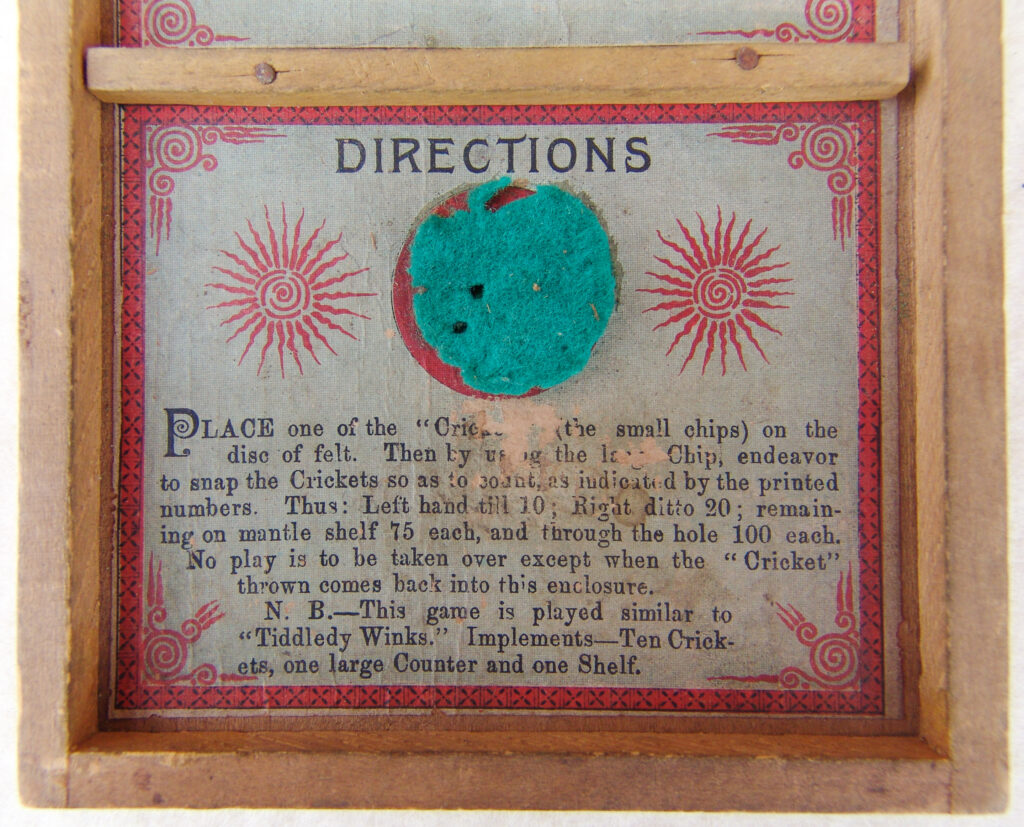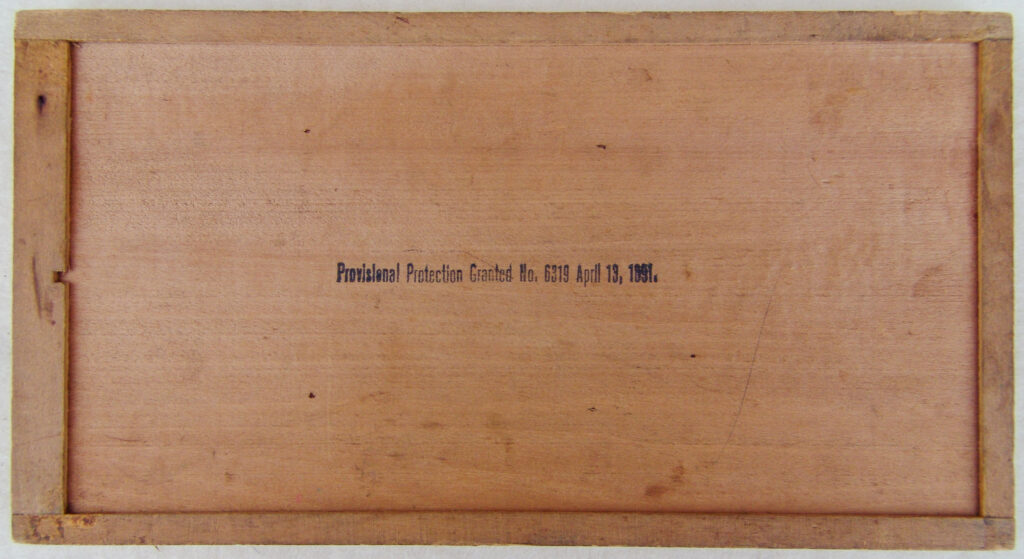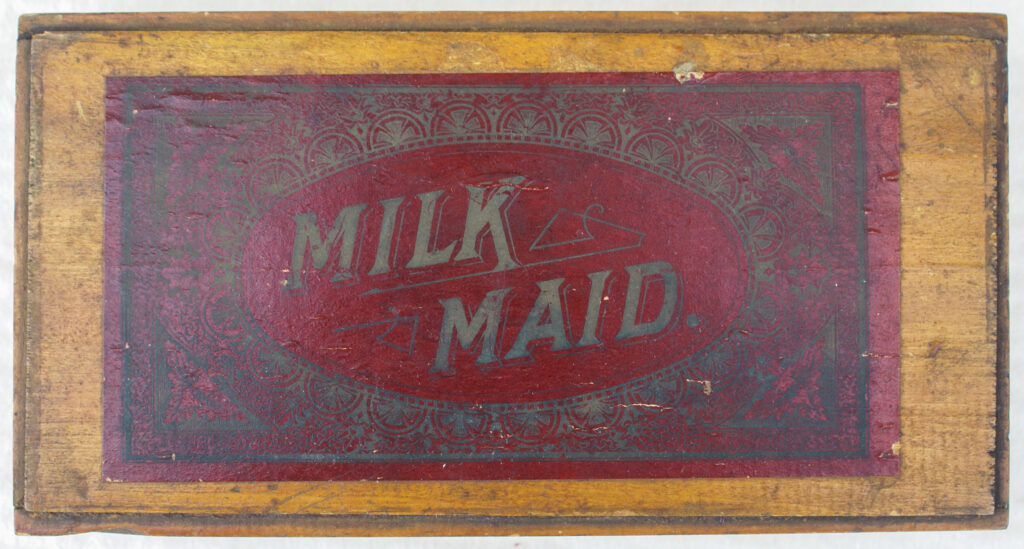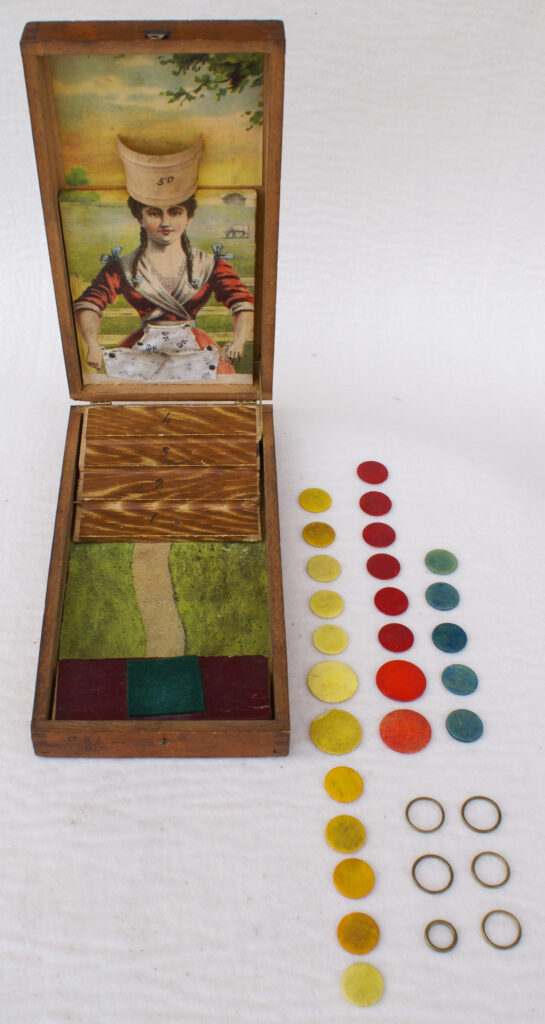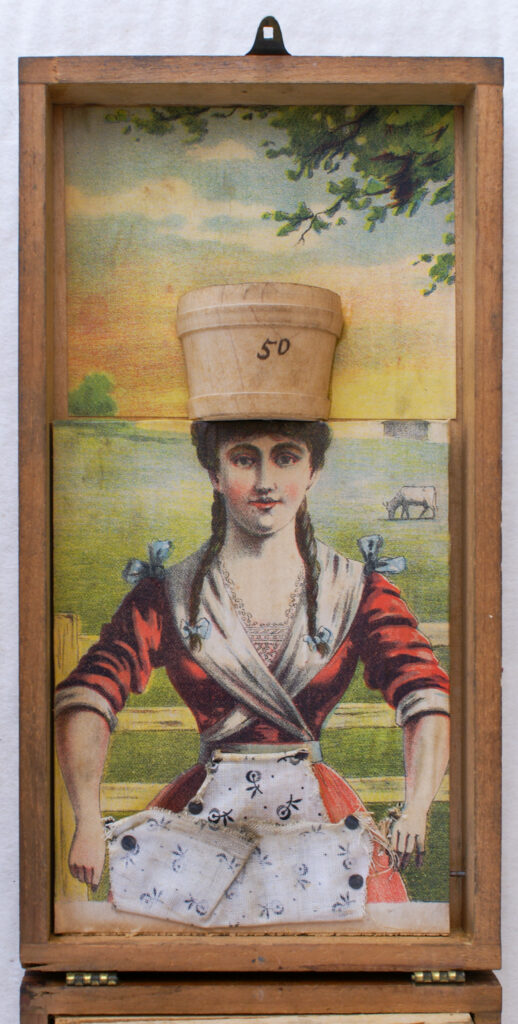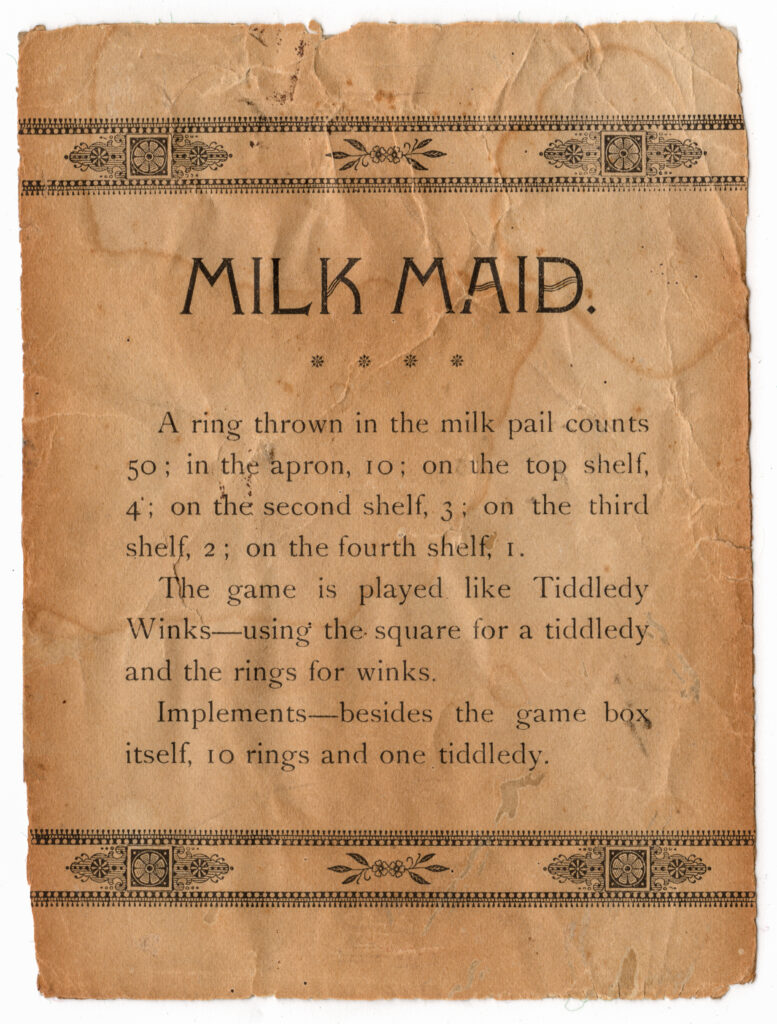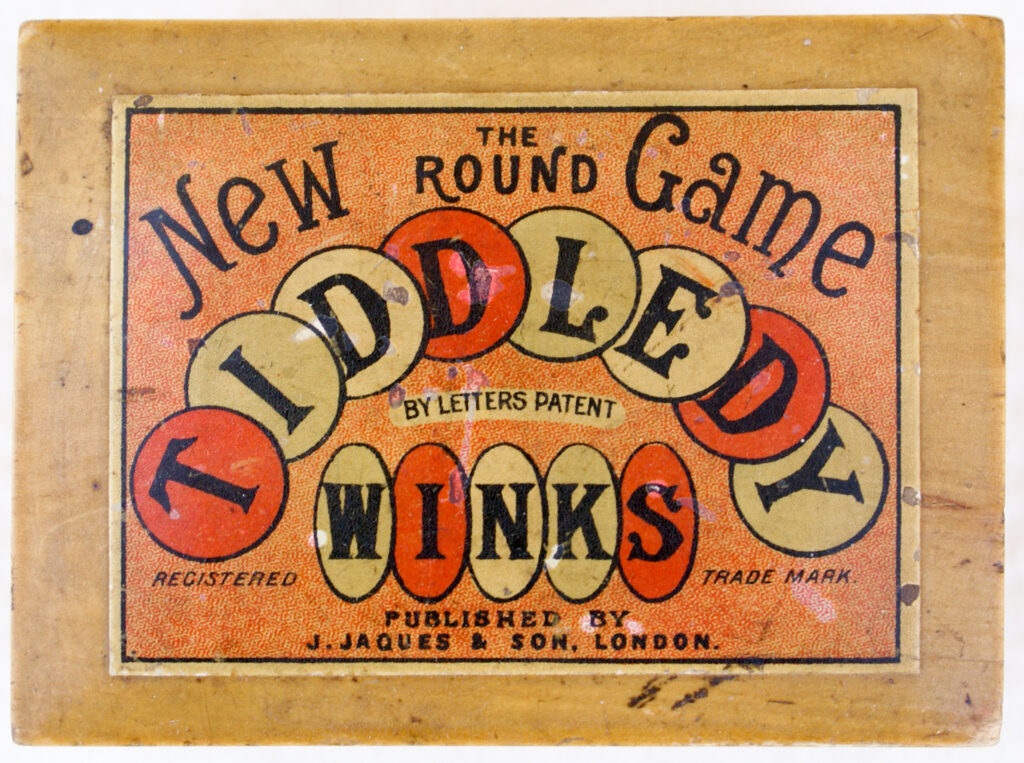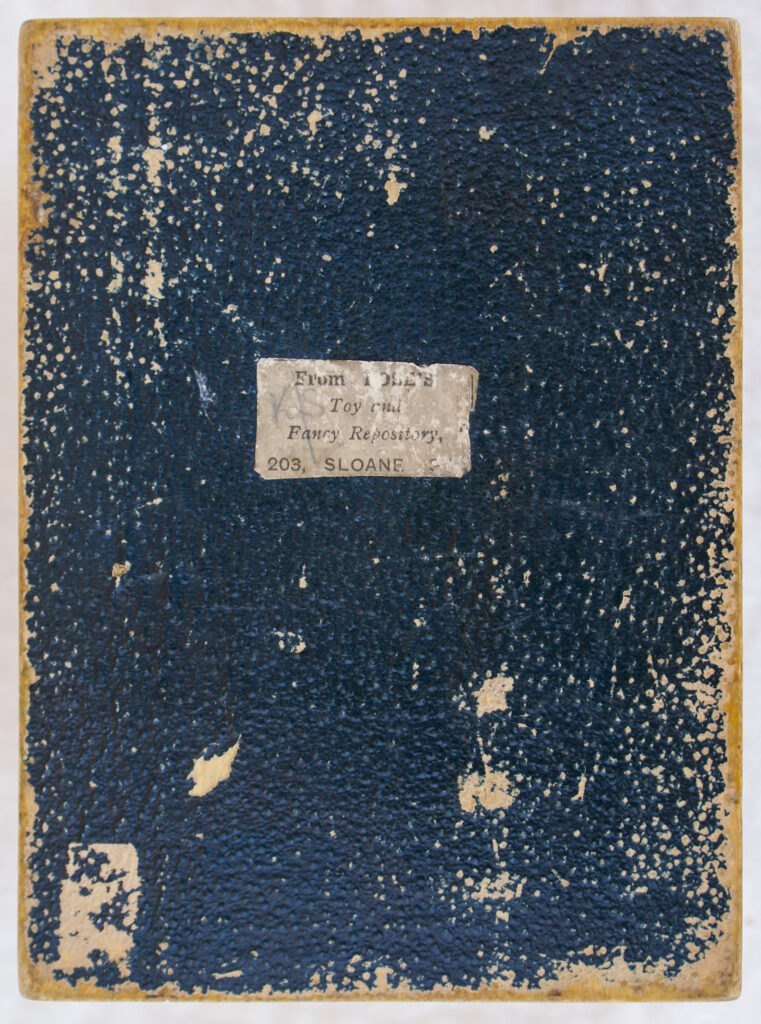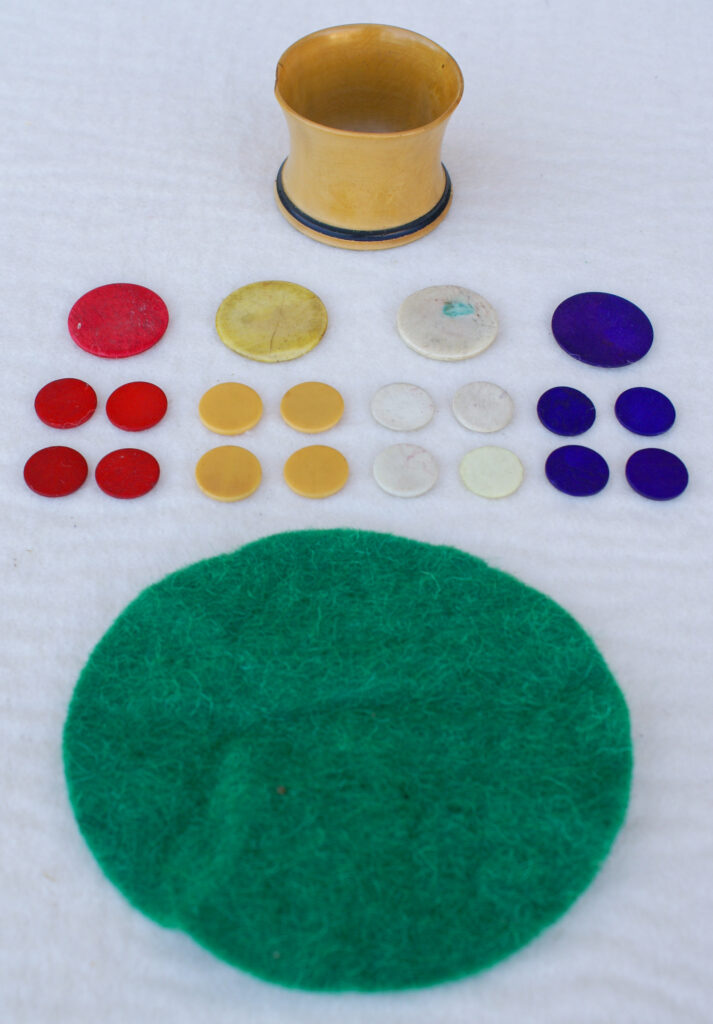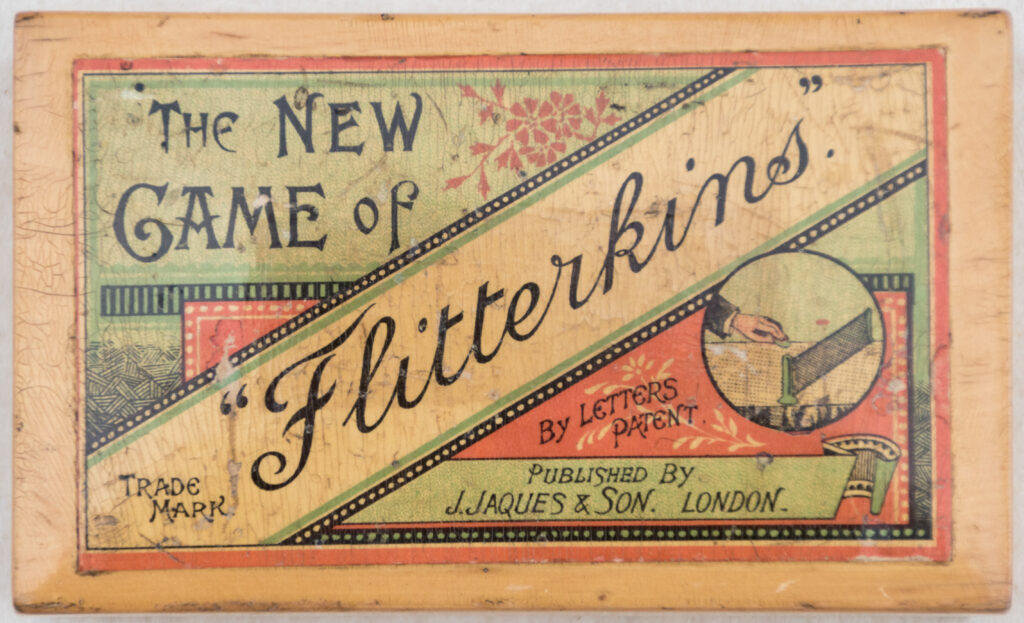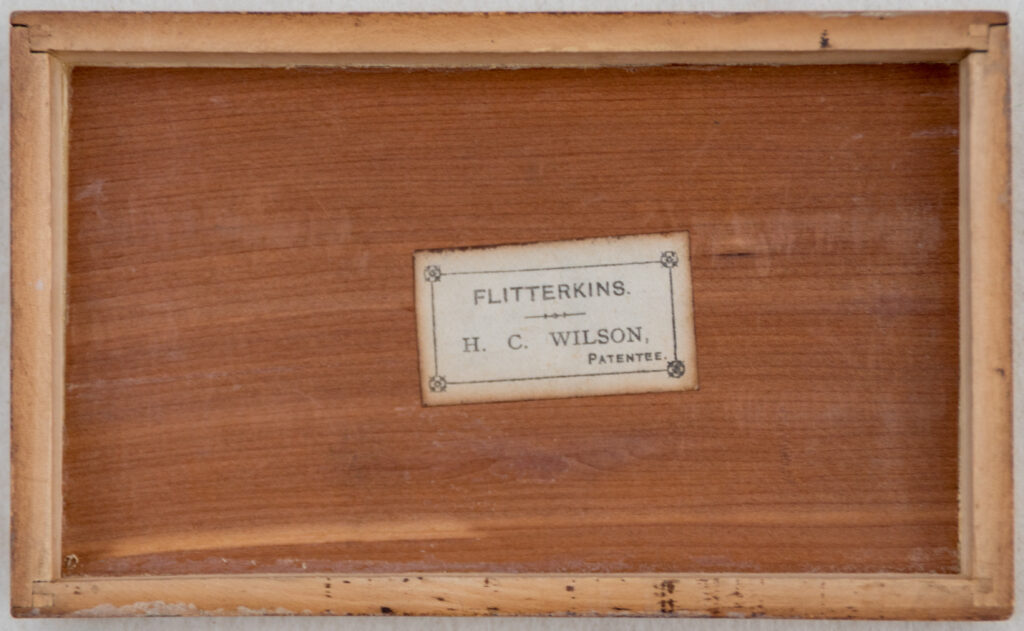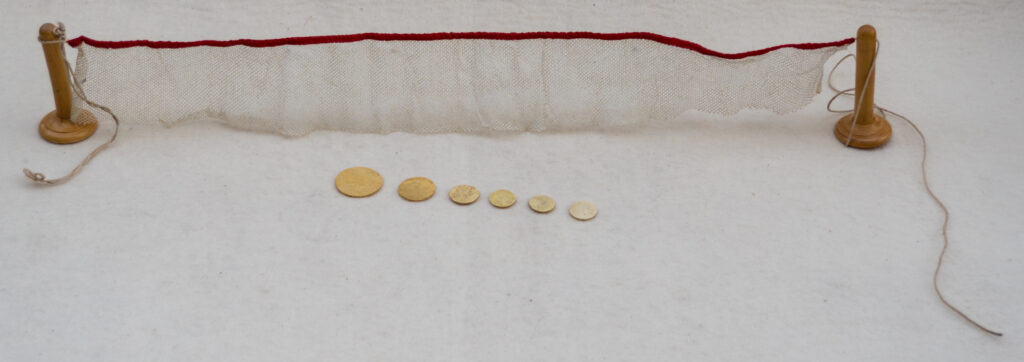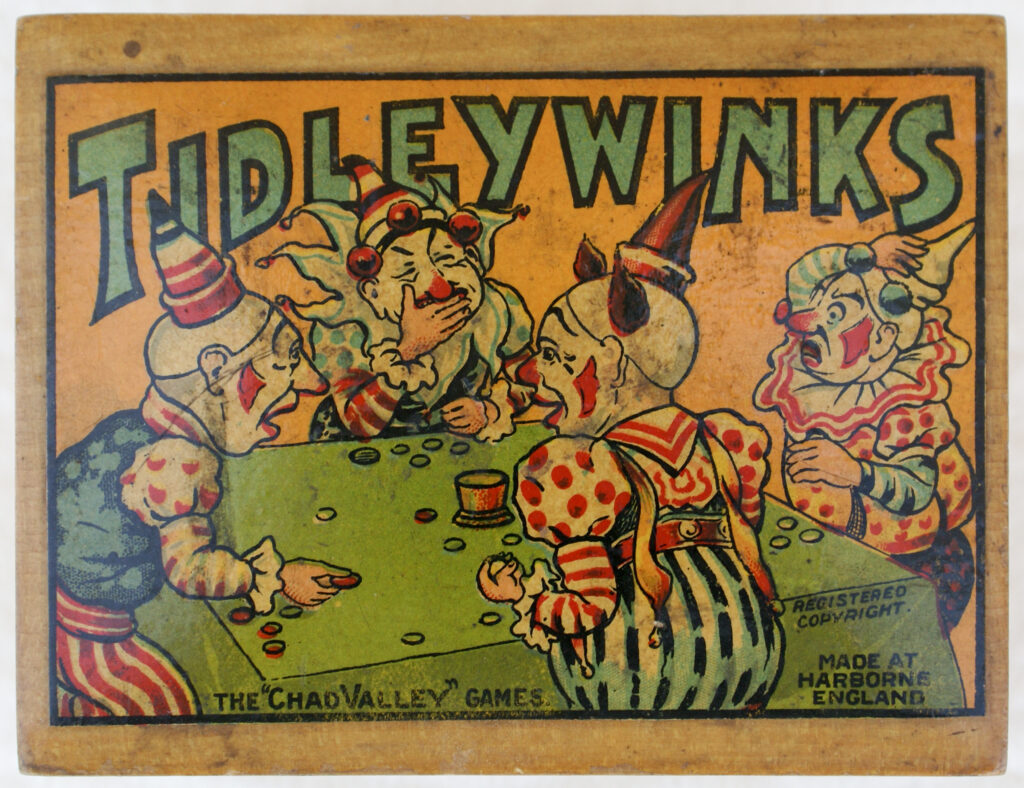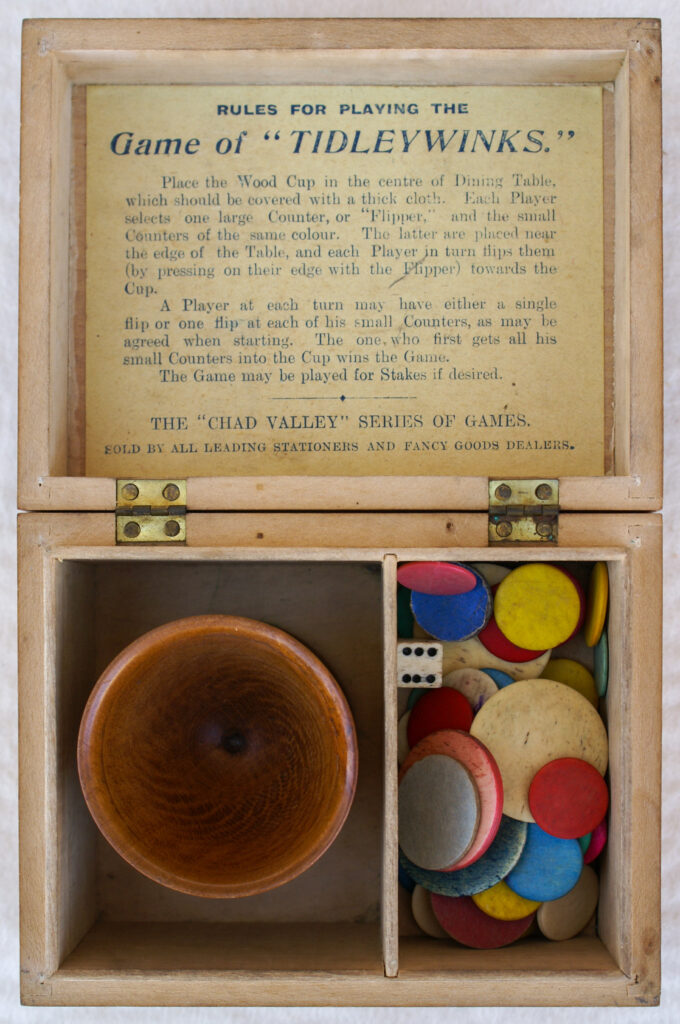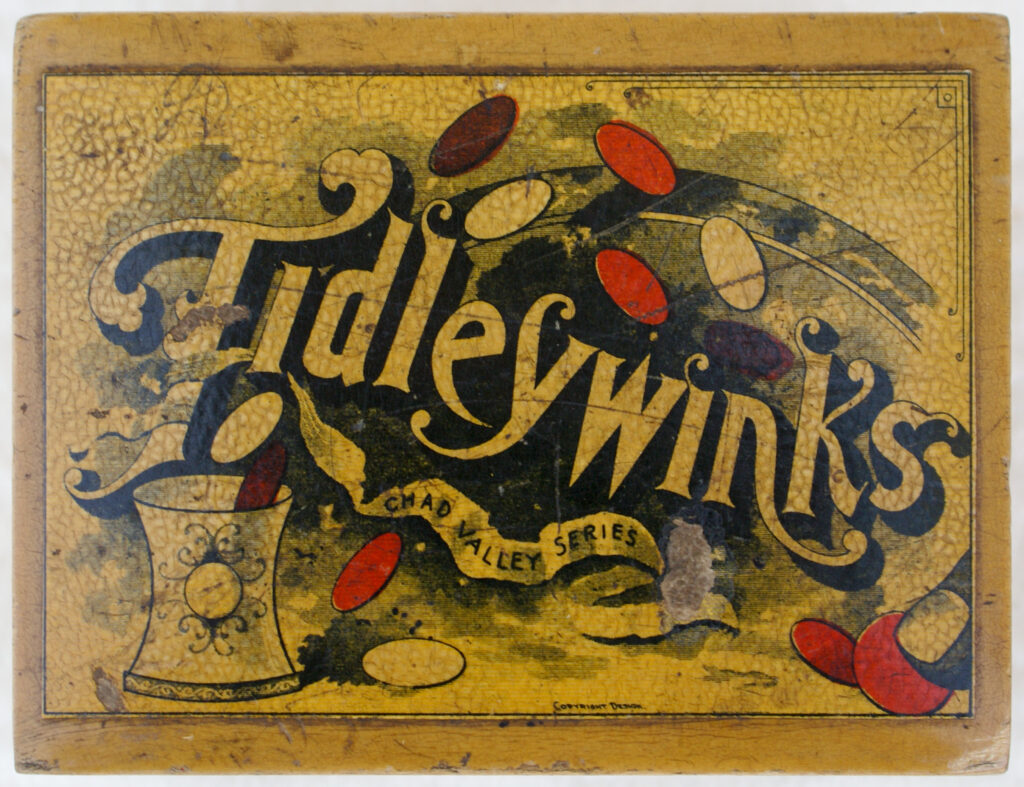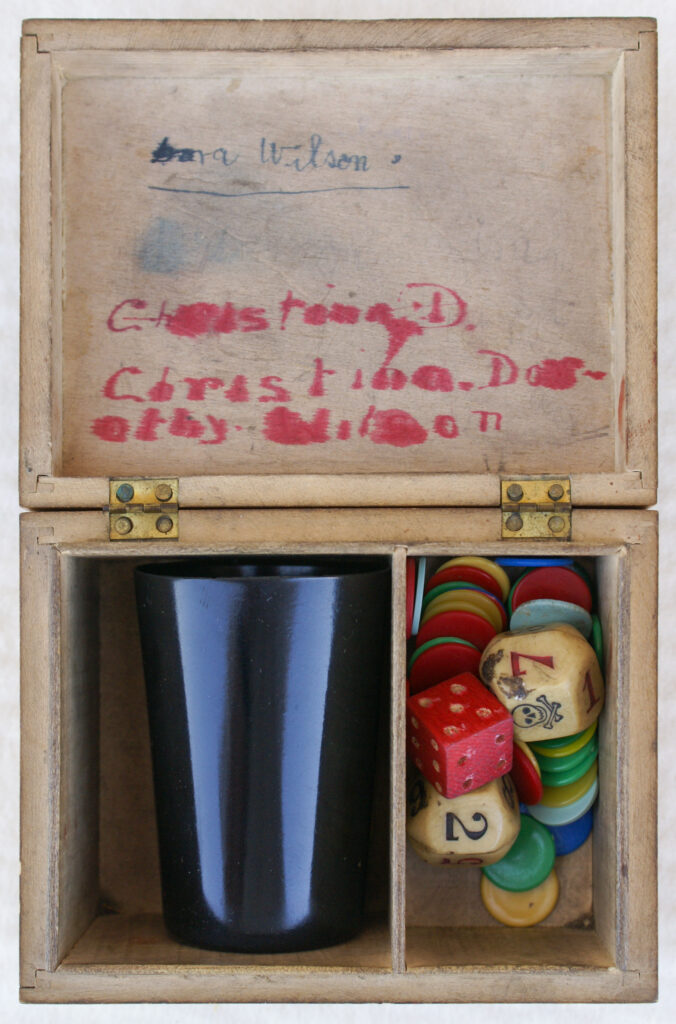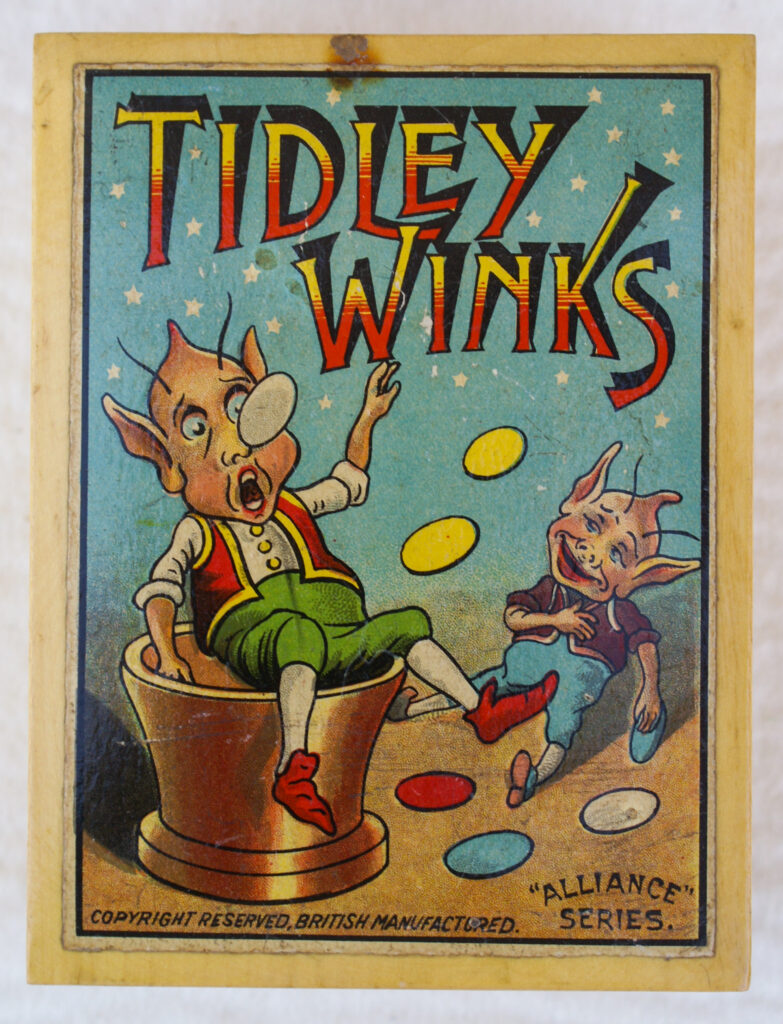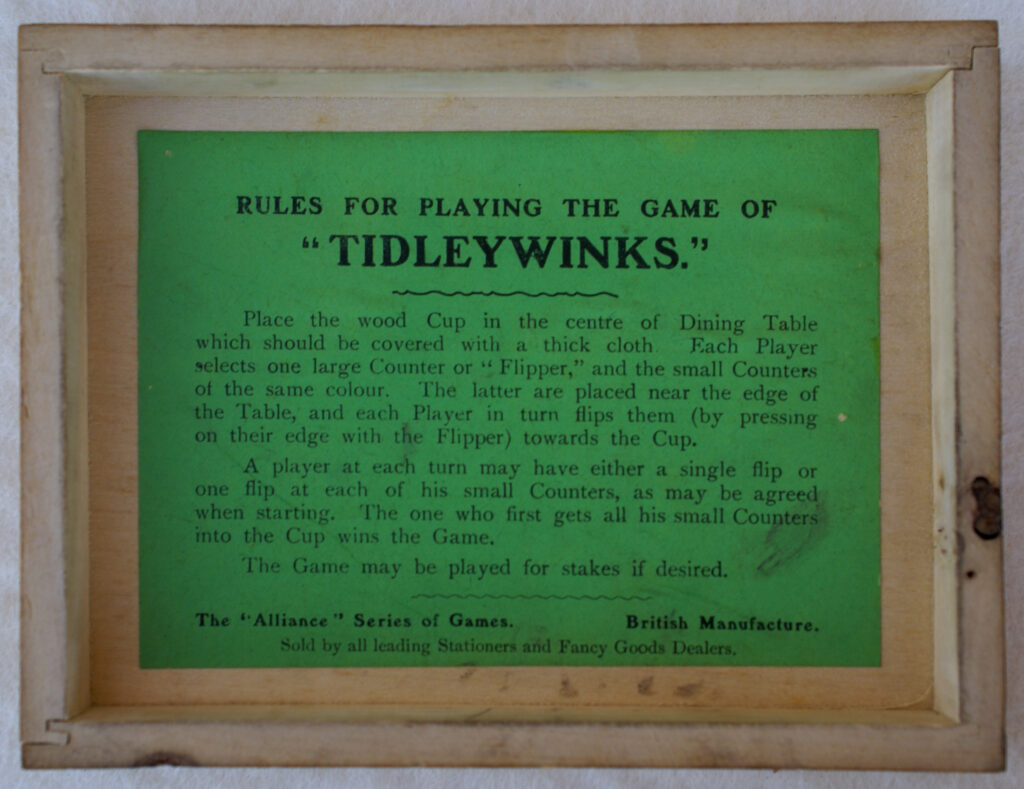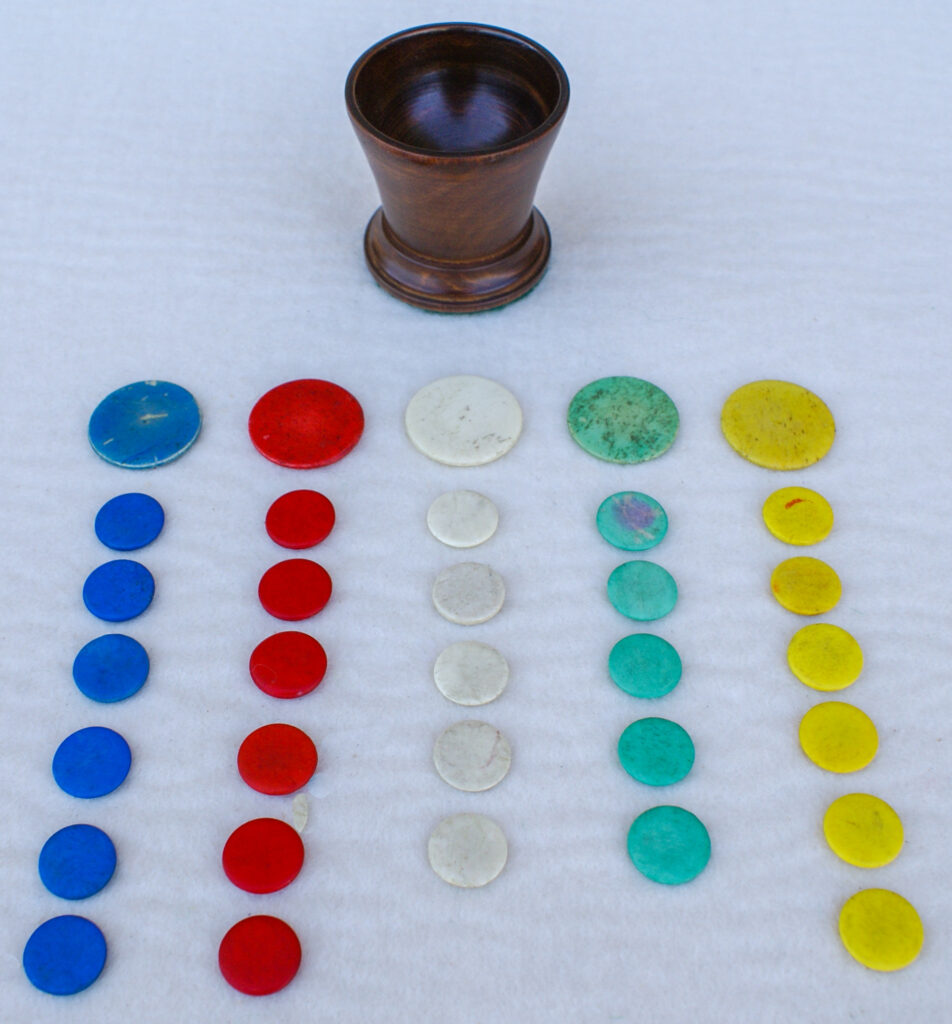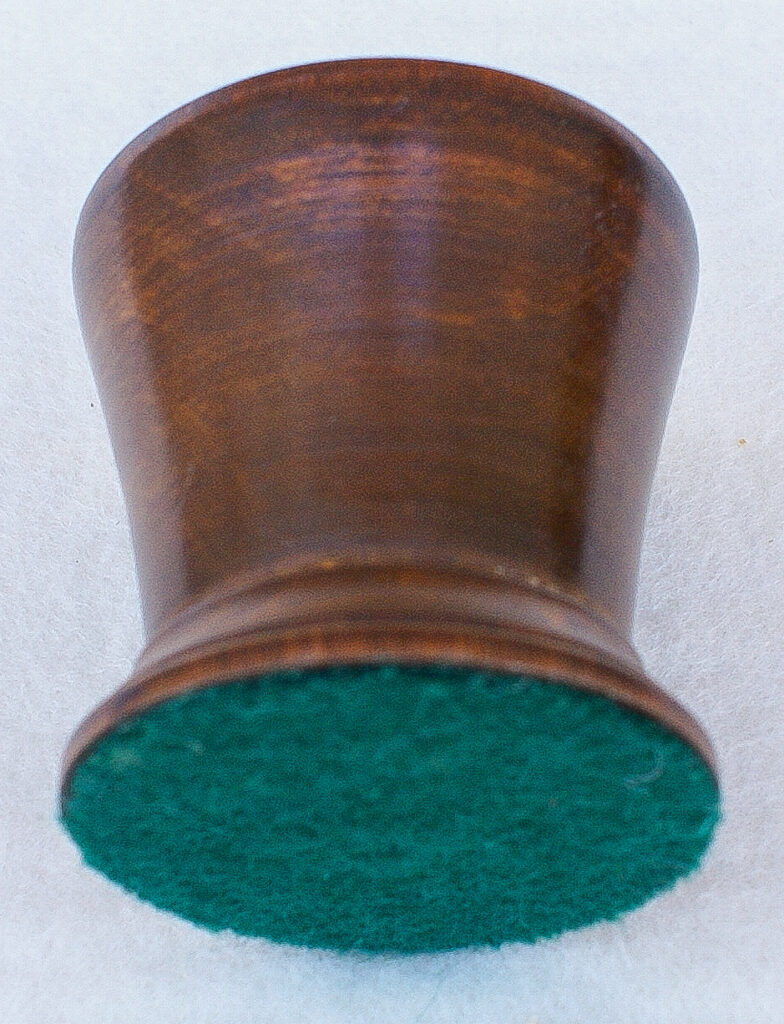Many but not all of the earliest tiddlywinks games were published in wooden boxes. On some of these games there was a sliding wooden cover. And of course, some of these early tiddlywinks games were issued with wooden-framed bases that had cardboard covers.
Quite a few of the early tiddlywinks games were issued in a range of qualities and corresponding prices. Hence, the wooden box editions were more expensive and used more expensive and higher quality components than the cheaper editions sold in cardboard boxes.
Tiddledy Winks in Plain Wooden Boxes
Let’s look at Tiddledy Winks games in wooden containers that don’t identify the maker, and sport rather simple covers.
An early one bears the title THE NEW GAME TIDDLEDY WINKS and has no illustrations on the cover, just text. While the date of this game is not known, it is likely to be from around 1890.
And a similar one, THE NEW GAME TIDDLEDY WINKS., adds to the cover an illustration of the cauldron pot, used as a target in the game. The cauldron pot itself is red inside and black outside, and has an attached metal handle. Since the game cover identifies it as a “NEW GAME”, it is also likely from close to 1890.
And then a quite similar game, dropping “NEW” from the title, and called THE GAME TIDDLEDY WINKS.
Wooden Tiddlywinks Games with a Bit of Color
Game of Tiddledy Winks • Believed to Be by R. Bliss
This GAME OF TIDDLEDY WINKS was published in a wooden box with a sliding top cover. The publisher of this game is believed by some to be R. Bliss of Pawtucket, Rhode Island (interestingly, where game and toy behemoth Hasbro has its headquarters to this very day), though the game is not marked with the publisher’s name, and no evidence has yet been found to support an association of this game with R. Bliss. The Rufus Bliss Manufacturing Company was founded in 1832 and was best known for its model trains, model ships, blocks, toys, and games.
The cover depicts a winks pot as a cauldron (black outside, red inside, and with a metal handle). One copy of the game examined includes inside a cauldron pot with a metal handle, while another copy instead has a nicely turned and dark-stained pot, and yet another copy a clear glass cup. One would think that the original editions all contained a cauldron pot with a metal handle.
Curiously, the cauldron shown on the cover has the inscription “TRADE MARK” inside it. However, the term TIDDLEDY WINKS was never trademarked in the United States, where this game is believed to have been produced. (Parker Brothers attempted to trademark TIDDLEDY WINKS but was turned down at the time by the U. S. Patent Office, which also arbitrated trademarks way back then). That said, TIDDLEDY-WINKS was indeed trademarked in Great Britain, with the application for the trademark submitted by Joseph Assheton Fincher in 1889 and seeing its approval in 1890.
The winks and squidgers included in this game appear to be made of clay, since they show no striations that are a telltale indications of bone winks, plus, several of the winks are broken. Clay winks and squidgers are quite prone to breakage given their mechanical structure.
Ives, Blakeslee & Williams • Early Wooden Tiddledy Winks Games
I. B. & W. Co. produced several tiddlywinks games in different wooden boxes. Most of these games refer to the game as “The New Merry Game”, and hence, all such games came out in the early 1890s.
The following I. B. & W. Co. game is the most basic one from the company, given that the cover illustration predominantly contains text, though there are a few flourishes in each of the corners. Like all of the I. B. W. & Co. TIDDLEDY WINKS games, the entire box is made of wood, and the top sports a sliding wooden cover.
The rules on this early game by I. B. & W. Co.. calls TIDDLEDY WINKS “THE LATEST CRAZE”, and indeed it was in the early 1890s.
Ives, Blakeslee, & Williams Co. produced another TIDDLEDY WINKS The New Merry Round Game, highlighting that this game was “FUN FOR TRHE ENTIRE HOME CIRCLE” and “JUST OUT”, hence debuting in the early 1890s. The wooden box is tinted all in red. The center circle on the cover illustration depicts a woman, man, and a boy, all smiling, though the man at center is holding and looking at a postal envelope. Not sure why he’s focused on an envelope on this intriguing tiddlywinks game!
This game came with two black painted cups and an assortment of winks and squidgers.
1891 • Wooden Boxed Tiddlywinks Sold By Selchow & Righter
Selchow and Righter debuted a series of wooden tiddlywinks sets with range of intriguing targets, as shown in an advertisement (page 417) and article (page 503) in The American Stationer trade magazine of 27 August 1891. Each game was priced at 25 cents or $2.00 a dozen, and each was housed in a wooden box with a hinge (save for Crickets on the Hearth).
- Snap Dragon, in which metal rings are shot using rectangular shooters, with hooks as targets
- Pedro, where rings are shot at a clown with an open mouth target as well as hooks on his ears and nose
- Crickets on the Hearth (or simply Crickets), with five different editions, where discs are shot to land in cauldrons or on top of the mantel of a fireplace
- Juno, where rings are shot toward cups and pins with numbered values
- Milk Maid, where rings are shot to land in the milkmaid’s apron or in a cup atop her head
All of these games were sold by Selchow & Righter as jobbers (resellers of games produced by others), and none of them have a publisher name marked on them. That said, Selchow & Righter advertised most of these games in trade journals, and notably in The American Stationer. While there is no direct evidence to support the following claim, it is believed that all of these games were manufactured in Bavaria and shipped to the U.S. to Selchow & Righter for sale in the United States.
In later years, Selchow & Righter designed and published its own tiddlywinks games rather than being jobbers reselling tiddlywinks games produced by others in its earliest years.
1891 • Snap Dragon • Sold by Selchow & Righter, jobbers
1891 • Pedro • Sold by Selchow & Righter, jobbers
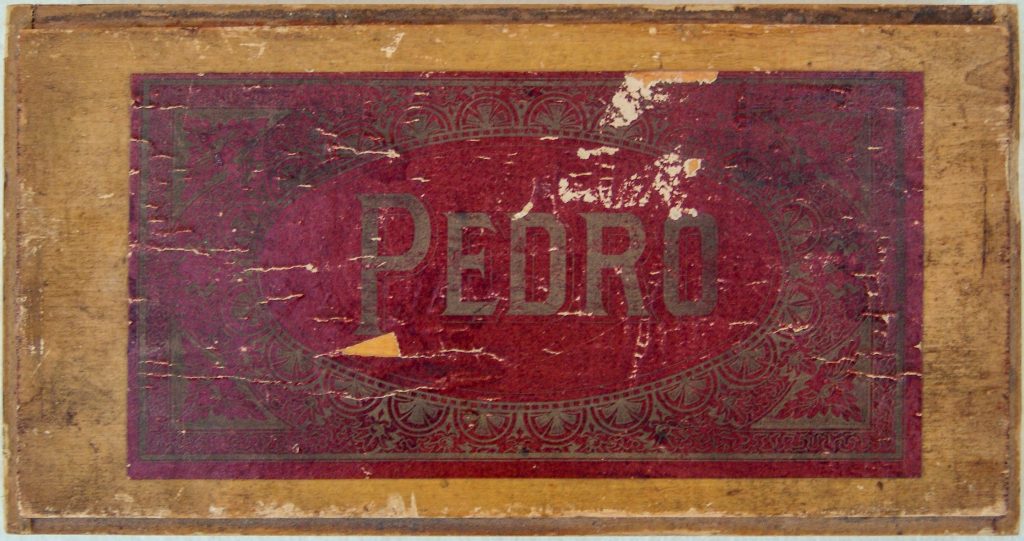
Rick Tucker Tiddlywinks Collection
Licenseable per Creative Commons CC BY-SA 4.0
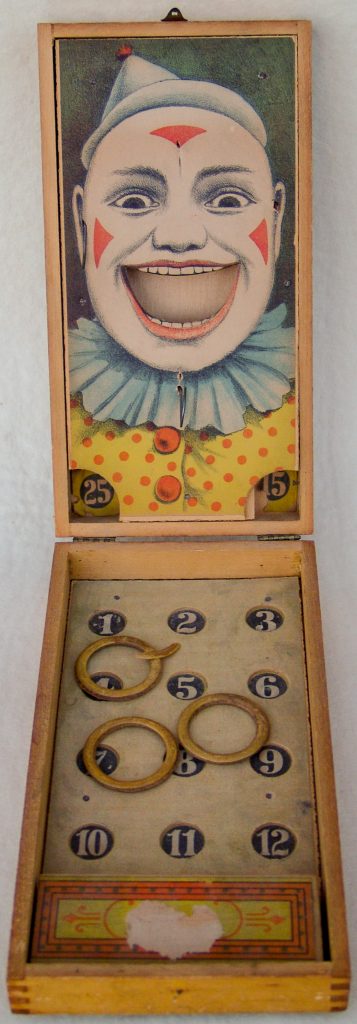
Rick Tucker Tiddlywinks Collection
Licenseable per Creative Commons CC BY-SA 4.0
1891 • Crickets • Sold by Selchow & Righter, jobbers
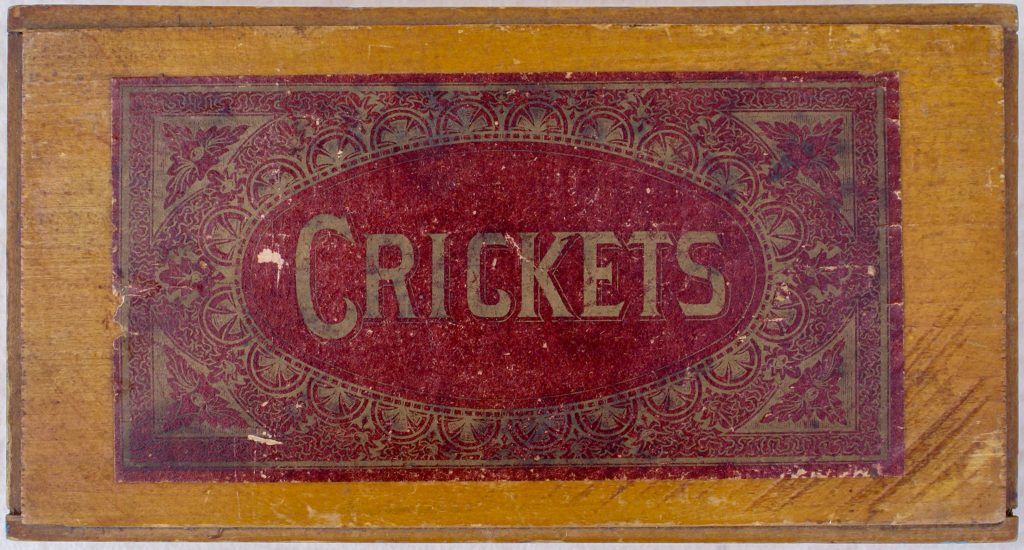
Rick Tucker Tiddlywinks Collection
Licenseable per Creative Commons CC BY-SA 4.0
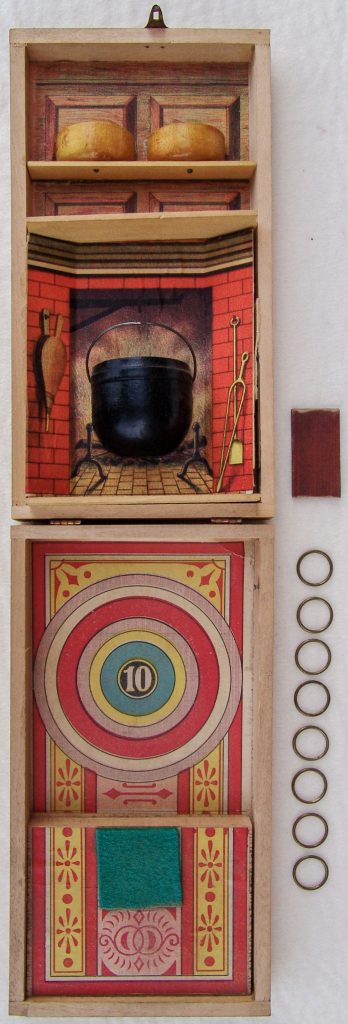
inside top and bottom plus brown rectangular squidger and metal quoit winks
Rick Tucker Tiddlywinks Collection
Licenseable per Creative Commons CC BY-SA 4.0
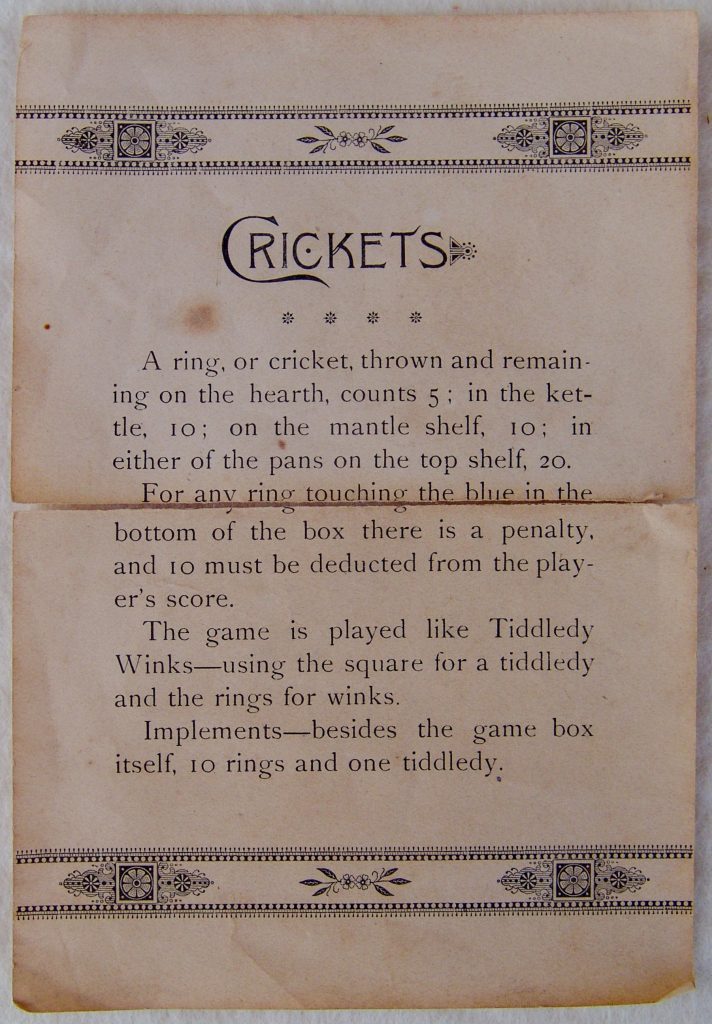
Rick Tucker Tiddlywinks Collection
Licenseable per Creative Commons CC BY-SA 4.0
1891 • Crickets on the Hearth • Sold by Selchow & Righter, jobbers
CRICKETS ON THE HEARTH was also sold by Selchow & Righter, though it did not come in a box. The game consists of two wooden pieces that snap together to form the game apparatus. The artwork and game layout on this game does not resemble the CRICKETS tiddlywinks game also sold by the company.
The bottom of the game apparatus is ink-stamped “Provisional Protection Granted No. 6319 April 13, 1891.”
The Fire and Fireside trade magazine in its 1 October 1891 issue’s Premium List supplement offered Crickets on the Hearth as a premium (in other words, free gift) with a new annual subscription to the magazine costing 60 cents.
The Hollander, Bradshaw, and Folsom’s Department Store in Boston, Massachusetts advertised the game for 10 cents, on Saturday only, in the Boston Daily Globe newspaper of 13 November 1891 on page 2.
1891 • Milk Maid • Sold by Selchow & Righter, jobbers
Mauchline Wooden Boxes
A small number of wooden tiddlywinks games produced in England (but not in the United States) were issued in Mauchline boxes, which were wooden boxes with illustrations on their tops while also usually having solid colors on the bottom of the boxes. In addition to Mauchline tiddlywinks games, Mauchline boxes were produced with illustrations of local buildings or scenes around England.
John Jaques & Son notably also produced their iconic early game of Tiddledy-Winks in a Mauchline wooden box edition in addition to the many cardboard box editions bearing quite similar cover graphics. This version, THE New ROUND Game TIDDLEDY WINKS • BY LETTERS PATENT • REGISTERED TRADE MARK, was produced throughout the 1890s following the trademark’s registration by Joseph Assheton Fincher in 1890.
To celebrate its heritage as the original publisher of Tiddledy-Winks games starting in 1889, Jaques of London produced a replica of this wooden game during the first decade of the 2000s, though these replicas were produced in China and not with any near the same quality as its Tiddledy-Winks games from the 1890s that incorporated hand-turned cups and bone winks.
J. Jaques & Son of London also published THE NEW GAME of “Flitterkins”, a tennis tiddlywinks game, in a wooden Mauchline box, noting that it was patented and trademarked on the cover. The inventor’s name, H. C. Wilson, appears on a label on the box bottom. Such labels were used by Jaques to alert the buying public that this game was the authentic game and not a copycat imitation. As it turns out, A. C. I. Margary was also listed as a patentee on the original patent; why the label on this game only includes H. C. Wilson is not known. See the Flitterkins entry in Chapter 7 for more information about this game and its inventors.
The “Chad Valley” Games were produced by the Johnson Brothers, Joseph and Alfred, in Harborne, England near Birmingham. The Chad Valley brand of games, toys, dolls, and puzzles was first used around 1920. They were prolific publishers of tiddlywinks and other games. This TIDLEYWINKS (as tiddlywinks was often spelled in Great Britain from the 1930s through the early 1950s) game depicting clowns playing tiddlywinks was produced in a wooden Mauchline box with a red bottom.
Chad Valley came out with another game of Tidleywinks in a wooden Mauchline box, this time using the brand Chad Valley Series. Note the finger at lower right in the cover illustration. A game with the same illustration was also produced in a cardboard box. Two girls wrote their names under the box lid: Anna Wilson and Christina Dorothy Wilson.
The following wooden Mauchline boxed game of TIDLEY WINKS shows two goofy-looking pixies fooling around on the cover. This game was produced under the “Alliance” Series of Games, which was produced by the same Johnson Brothers who produced The “Chad Valley” Series of Games. Note that the rules for this game are identical to the rules in the Chad Valley game above with the clowns on the cover.
The winks and squidgers are made of bone, dyed into 5 colors. The quality wooden pot was produced by turning on a lathe; note the felt attached to the bottom of the pot. This is the only tiddlywinks pot seen so far with felt attached.
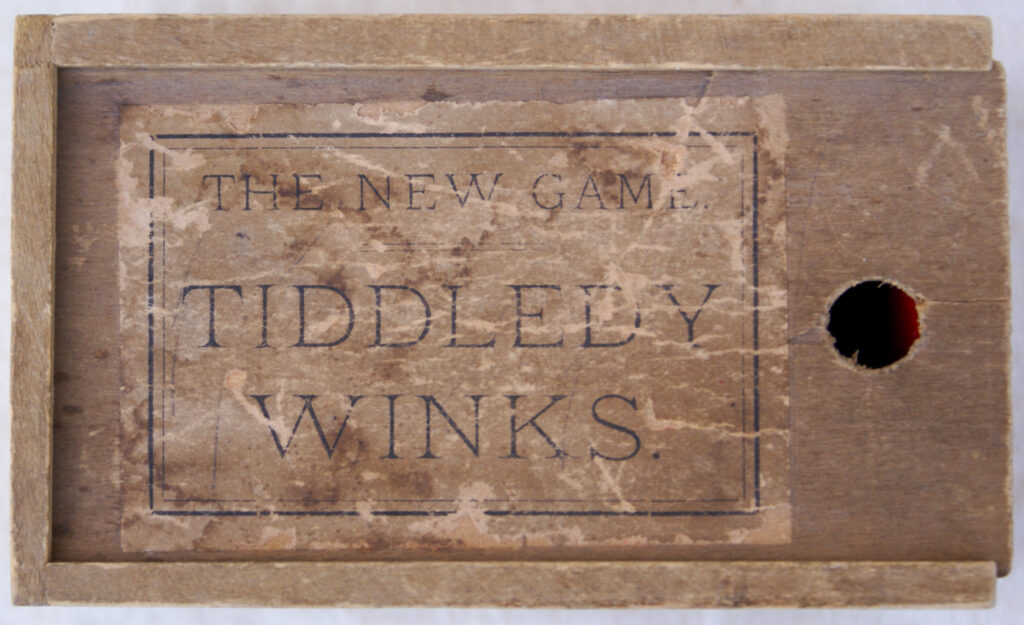
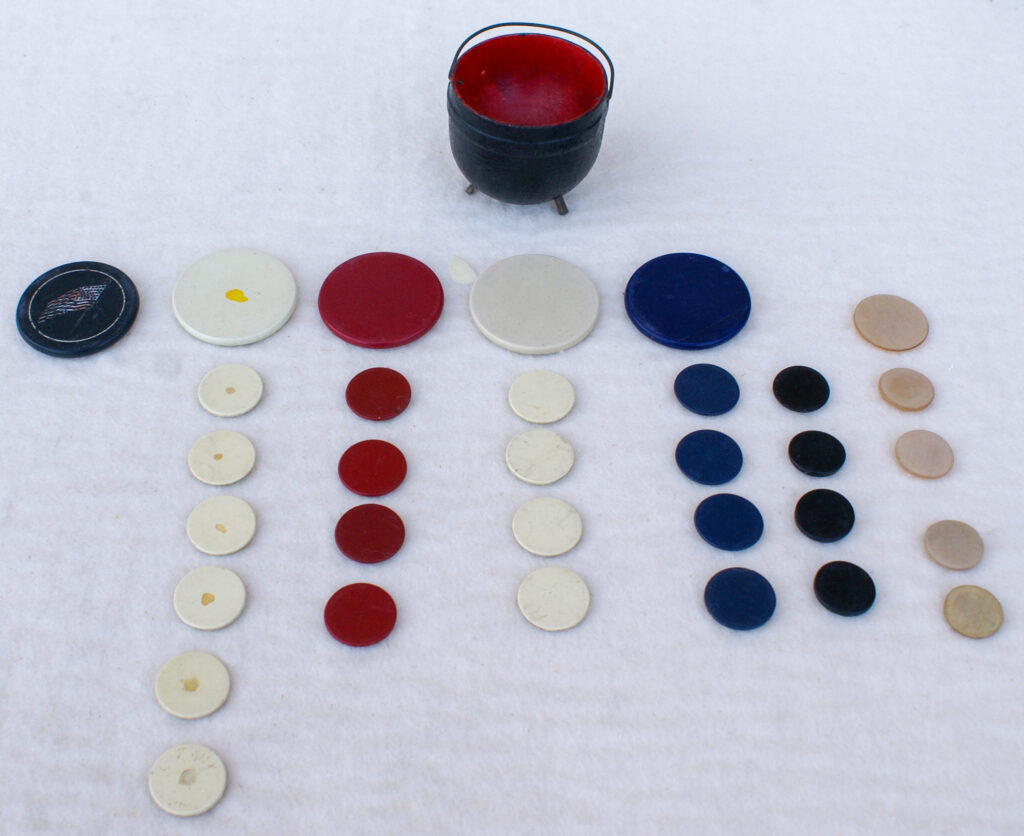
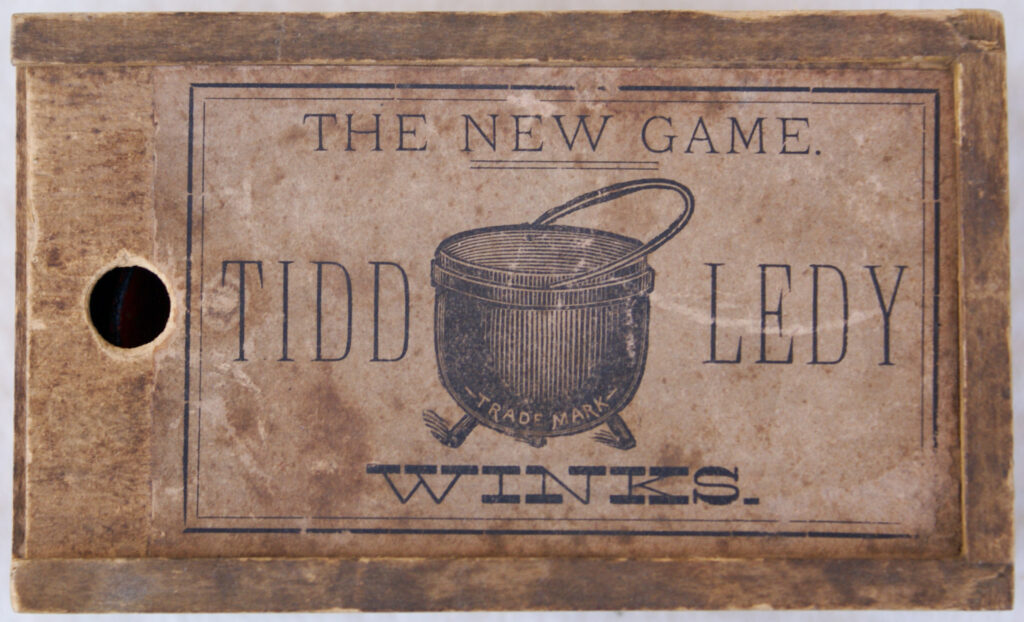
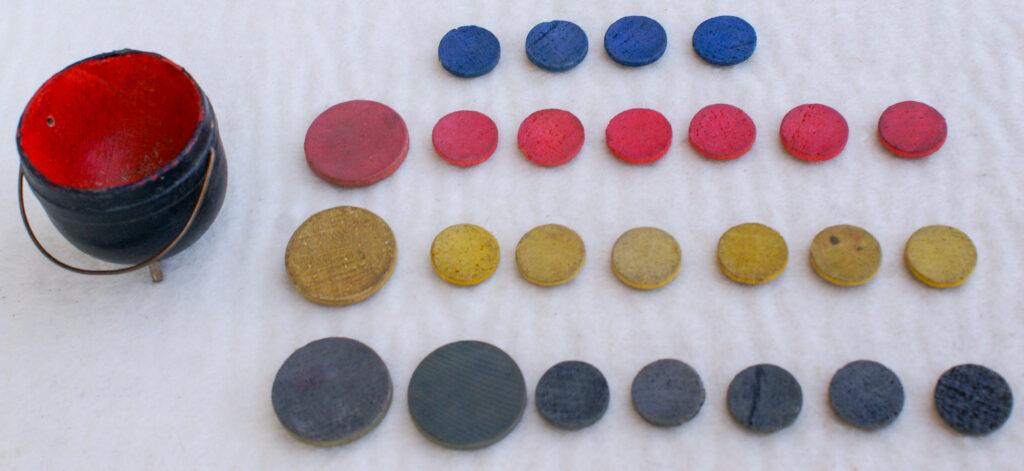
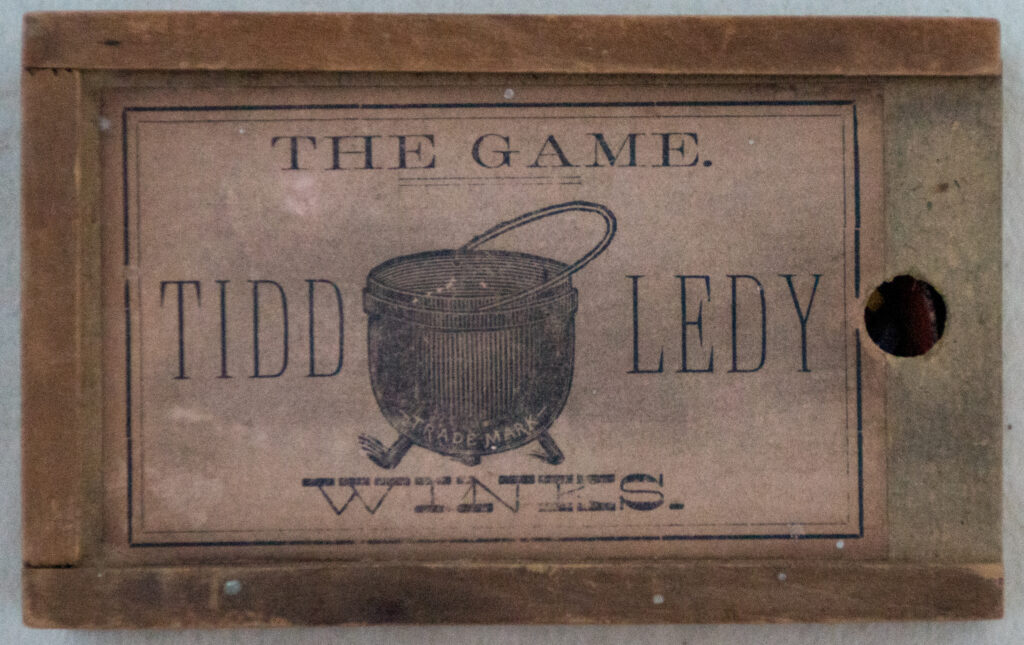
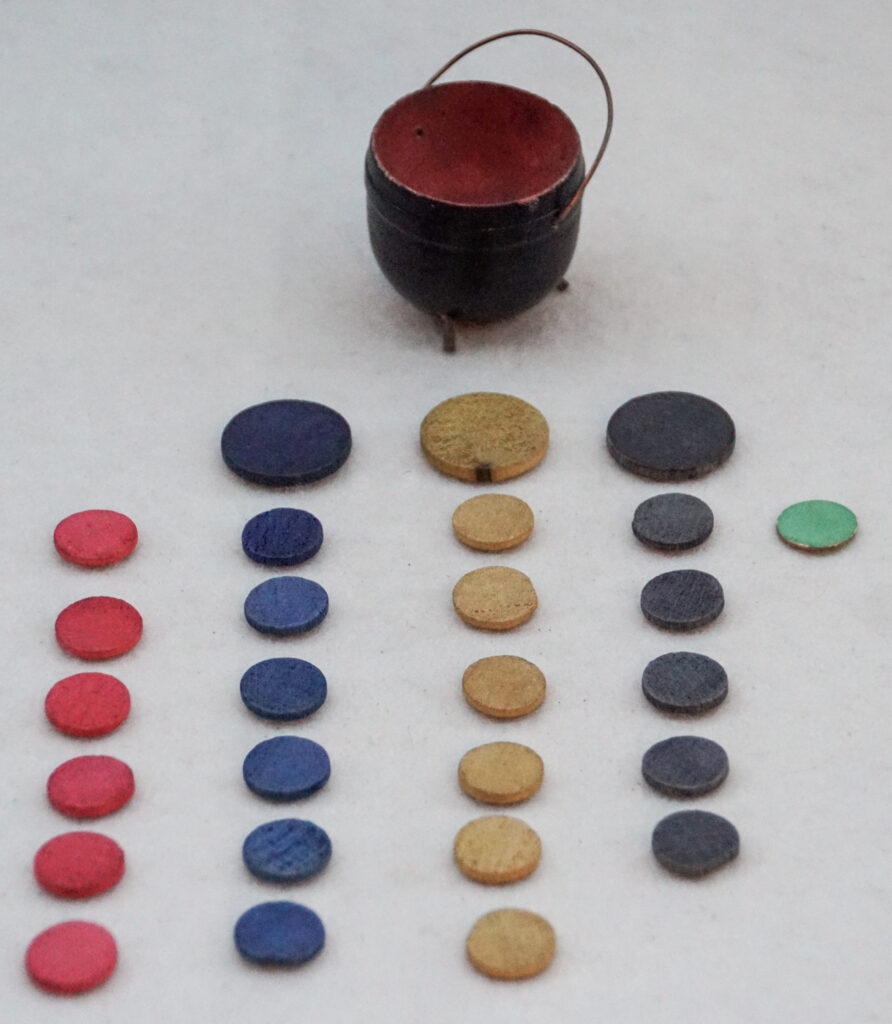
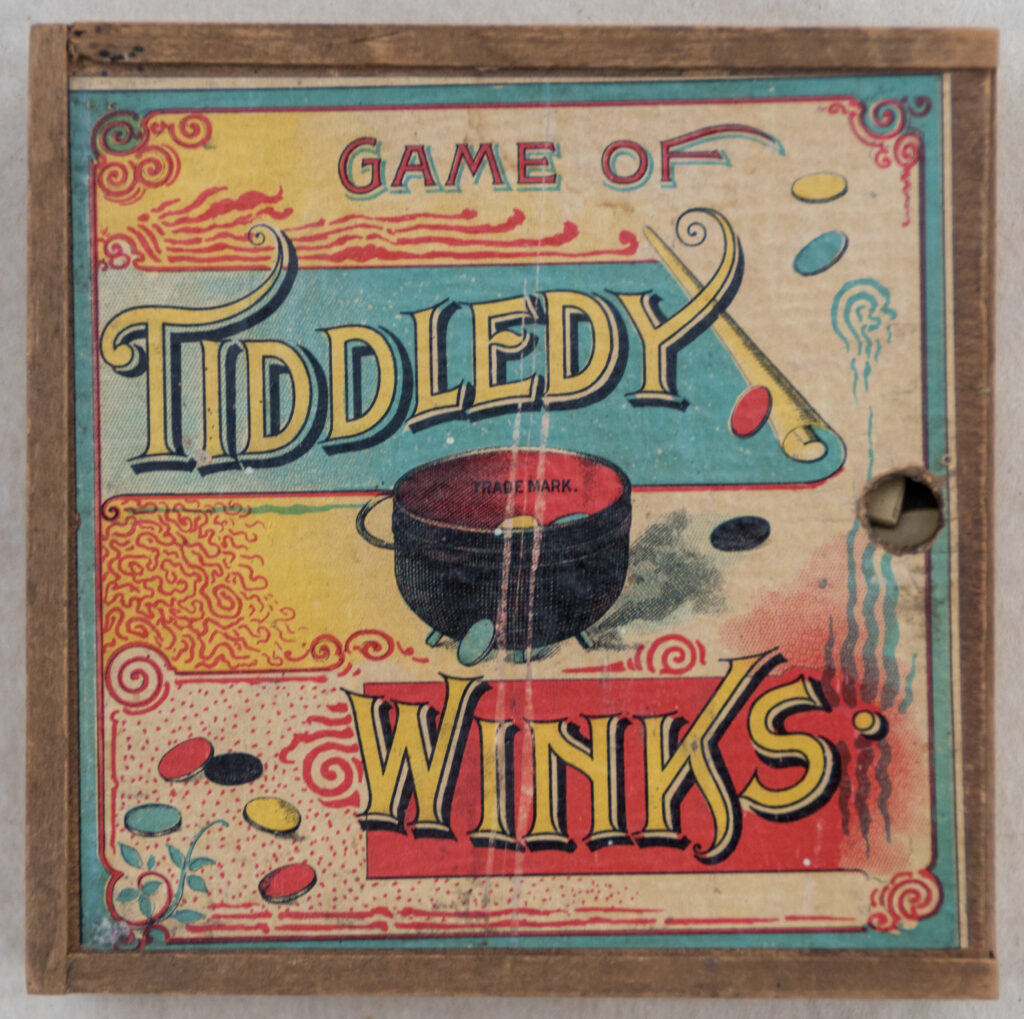
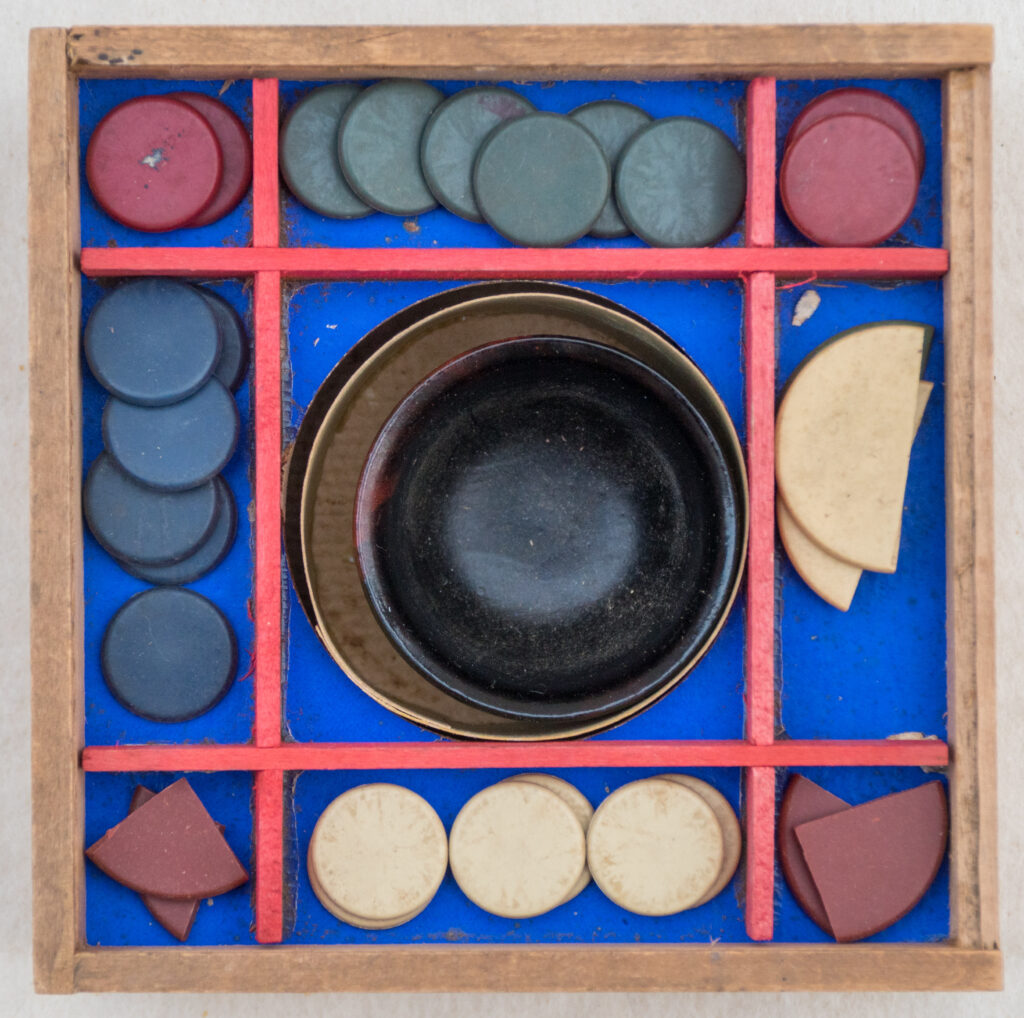
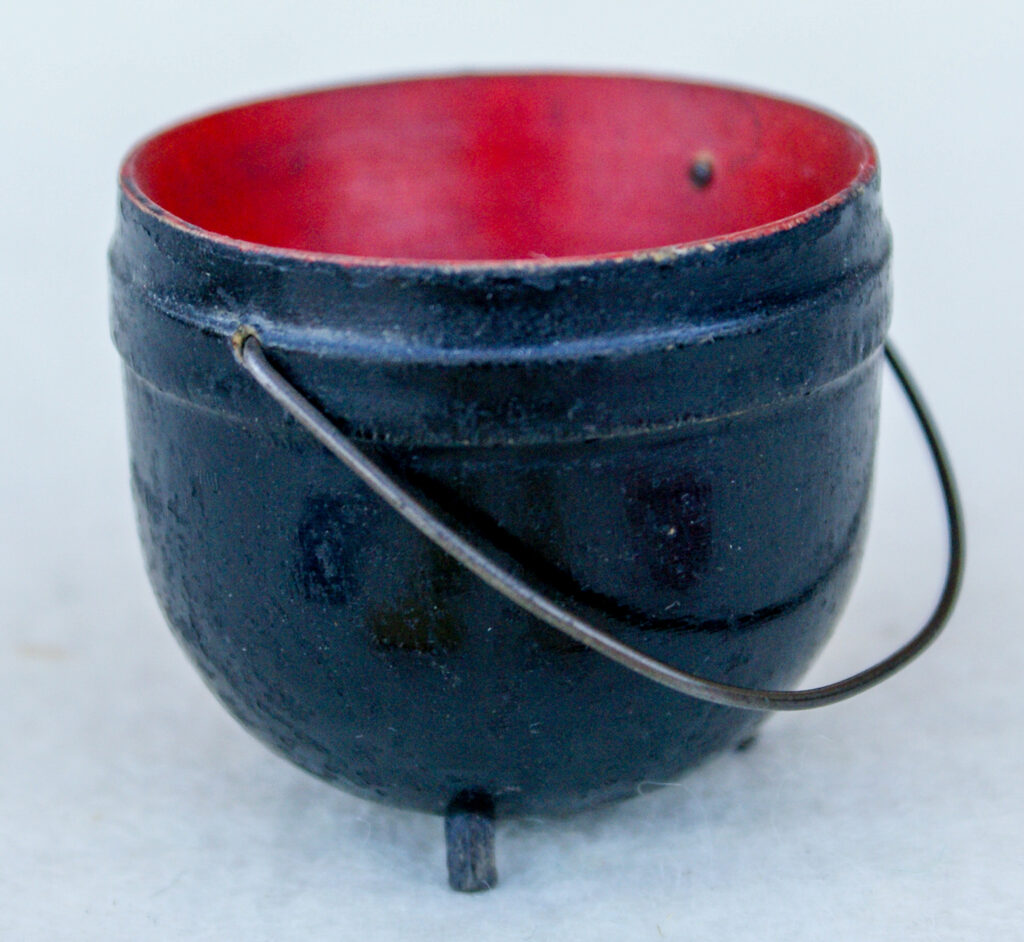
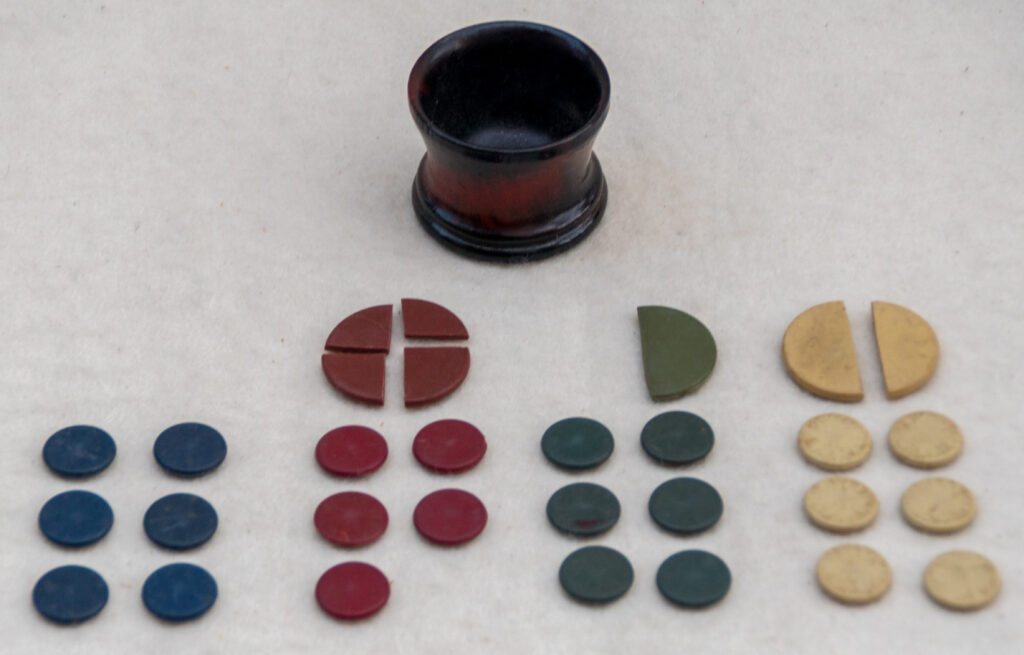
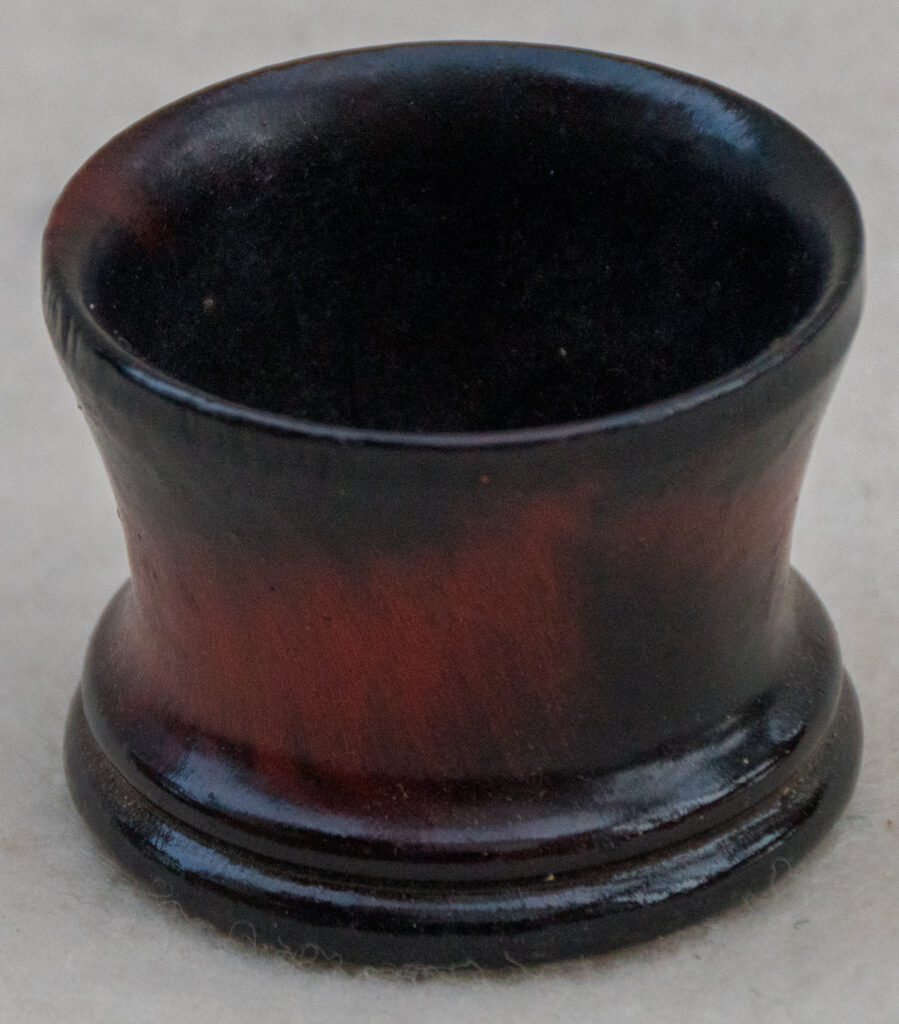
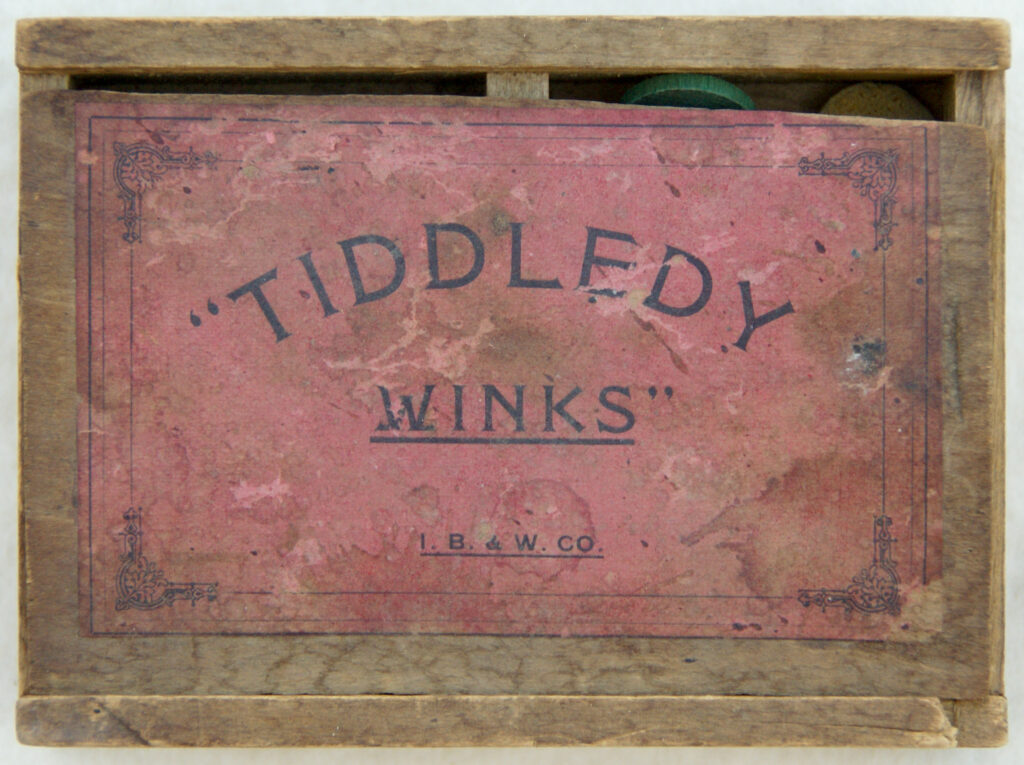
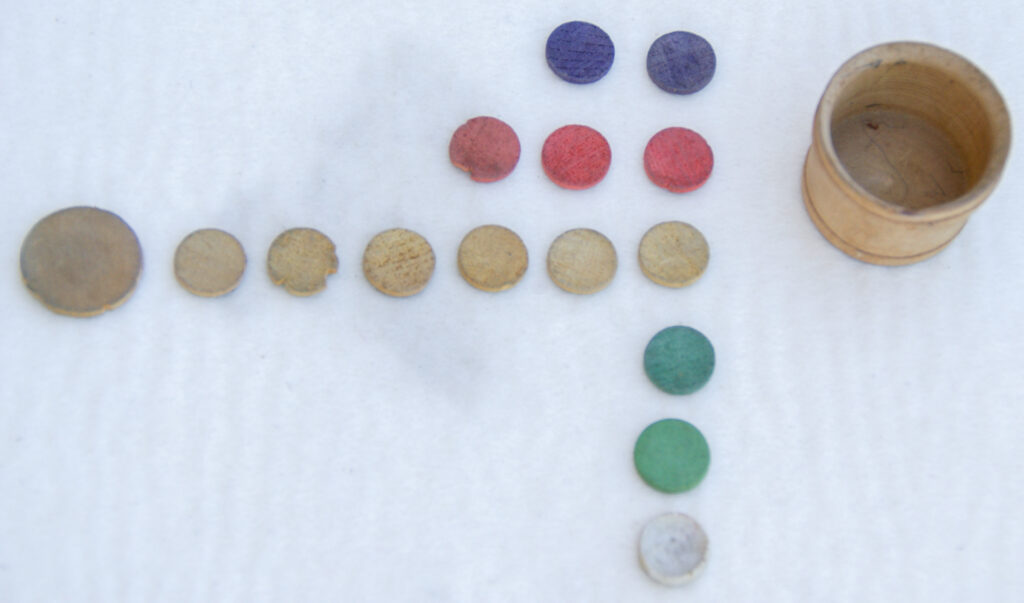
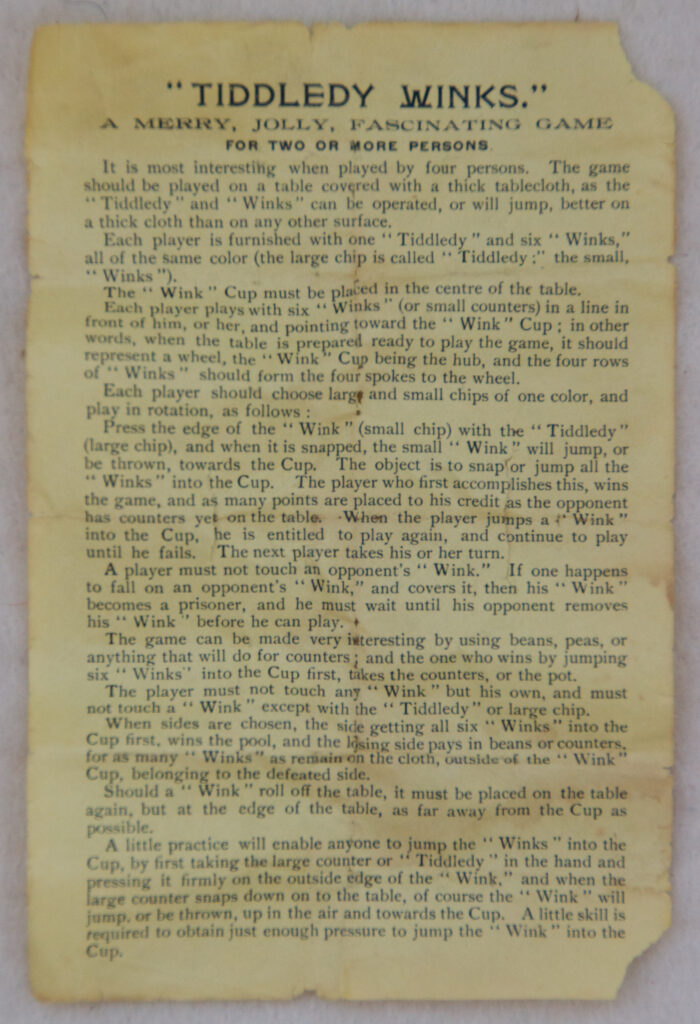
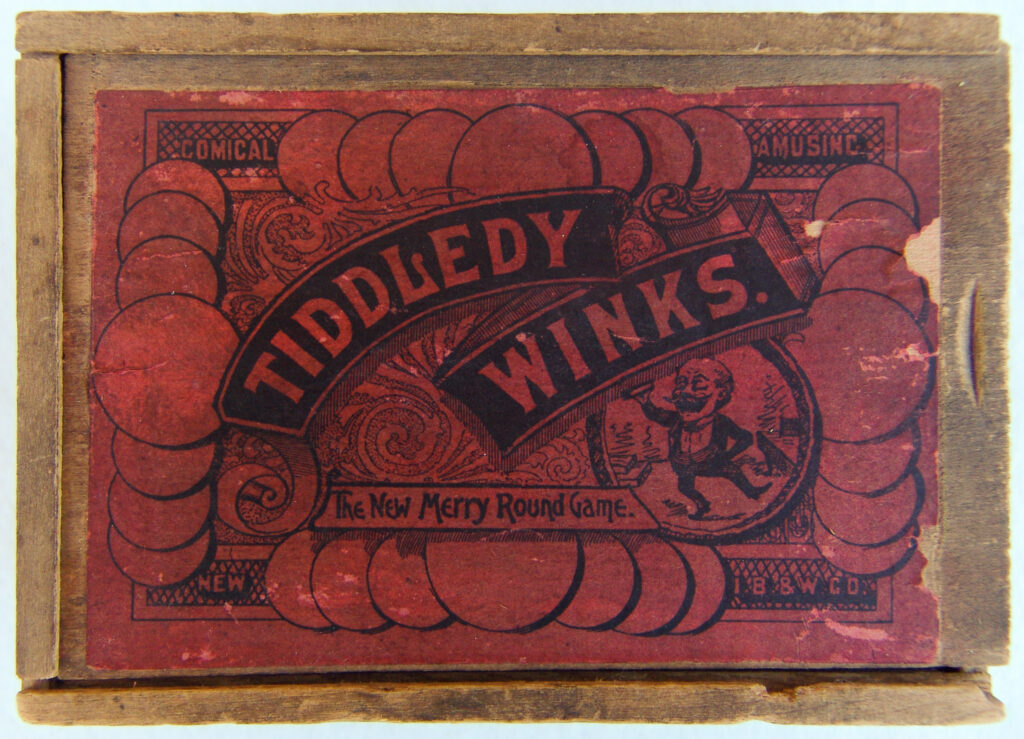
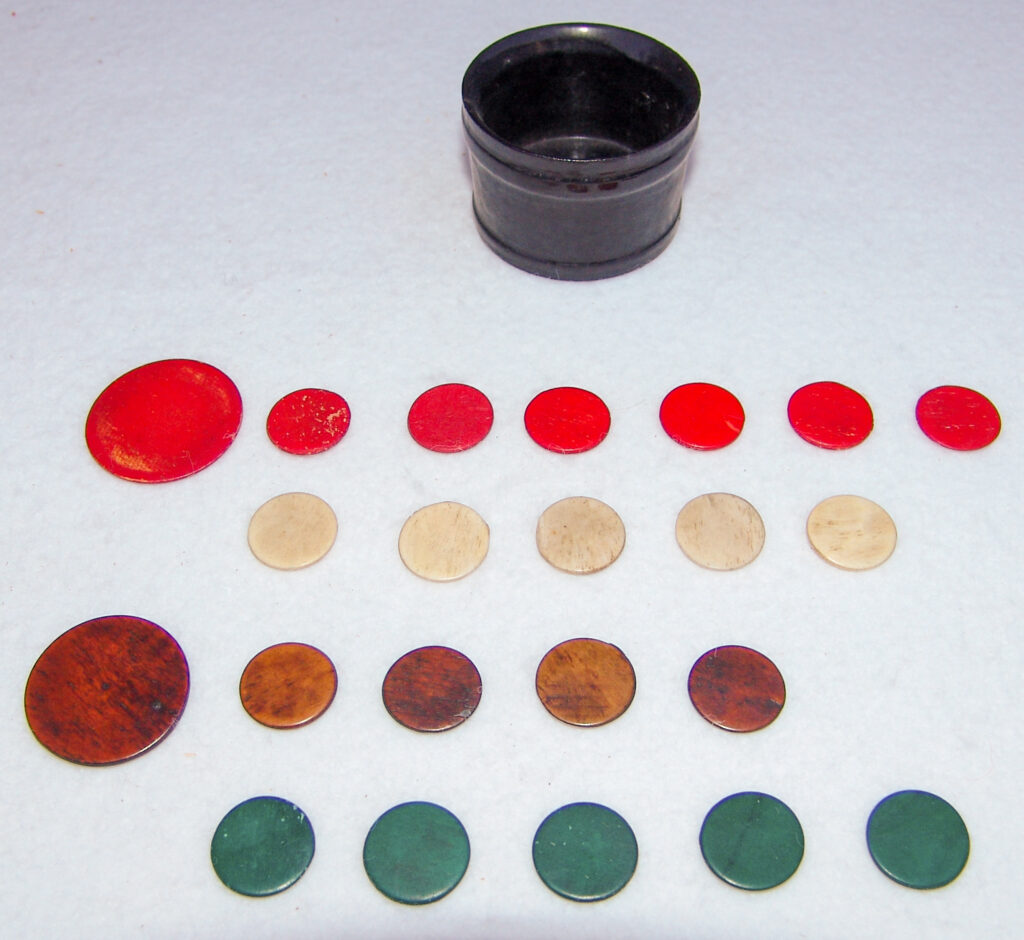
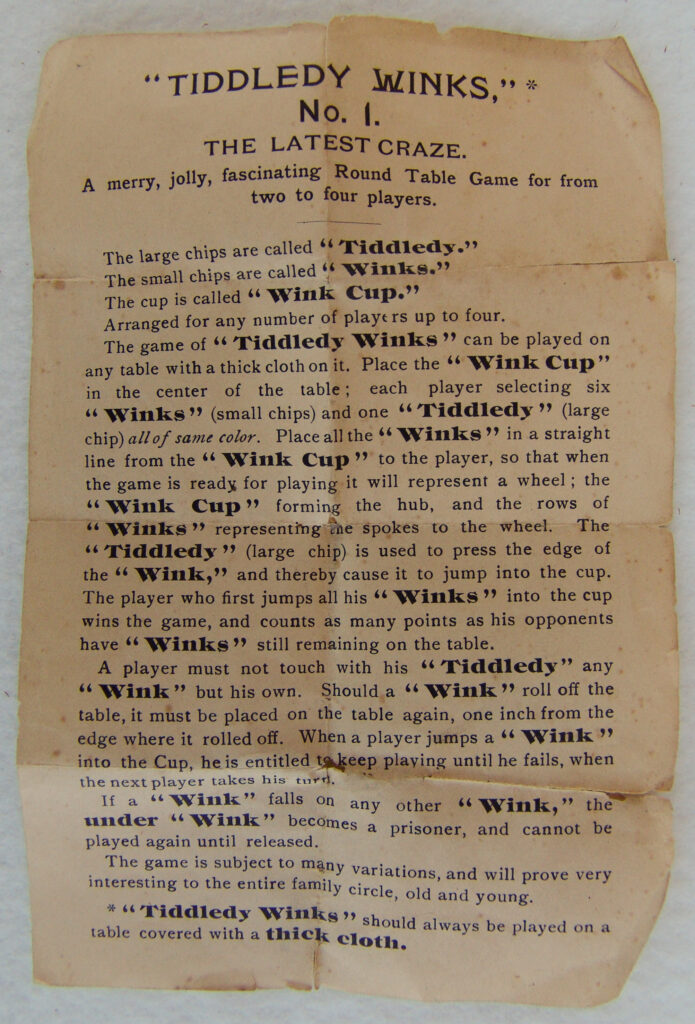
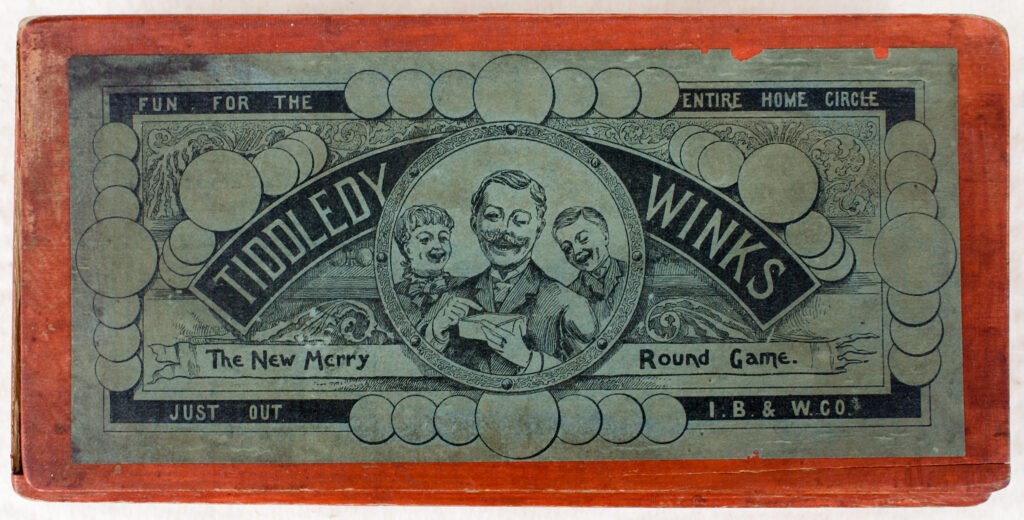
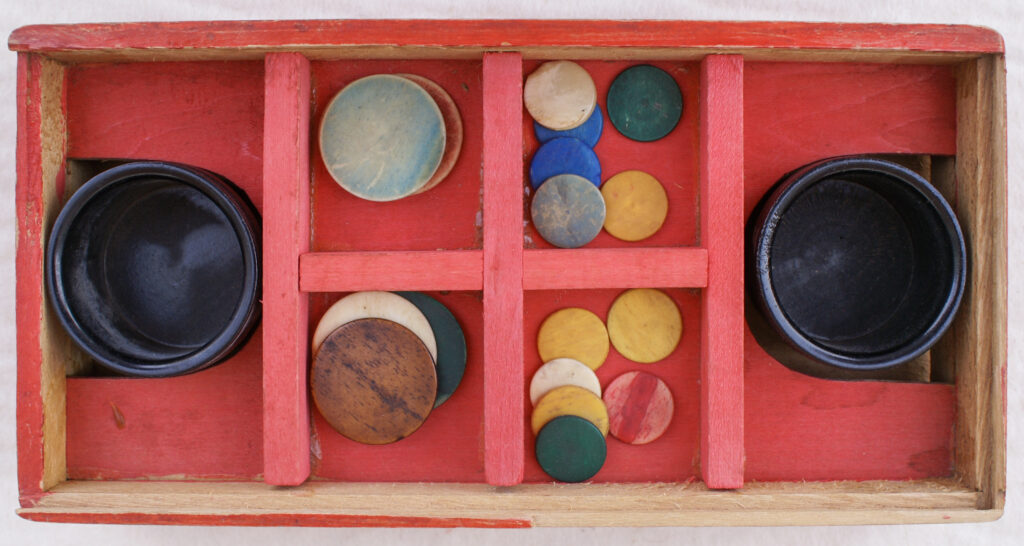
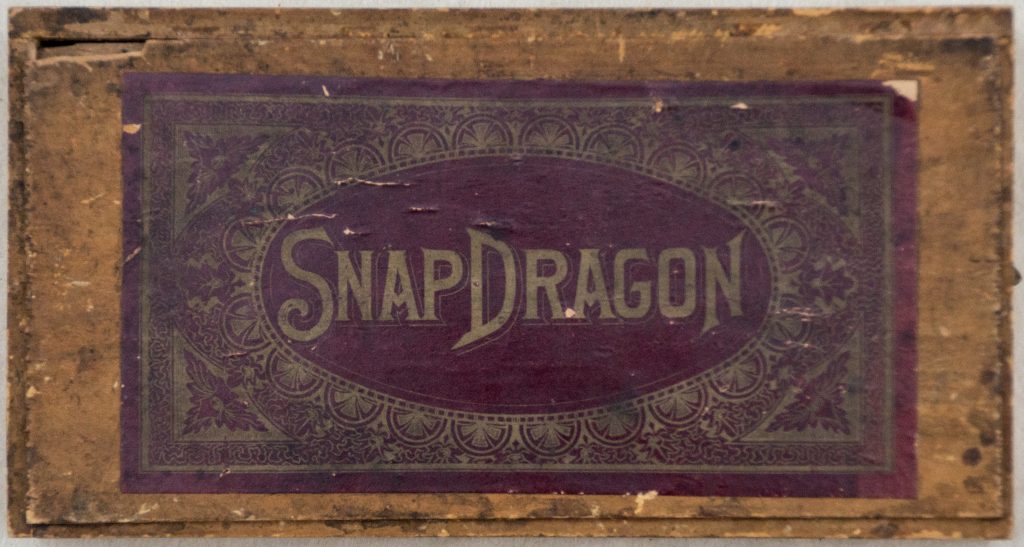

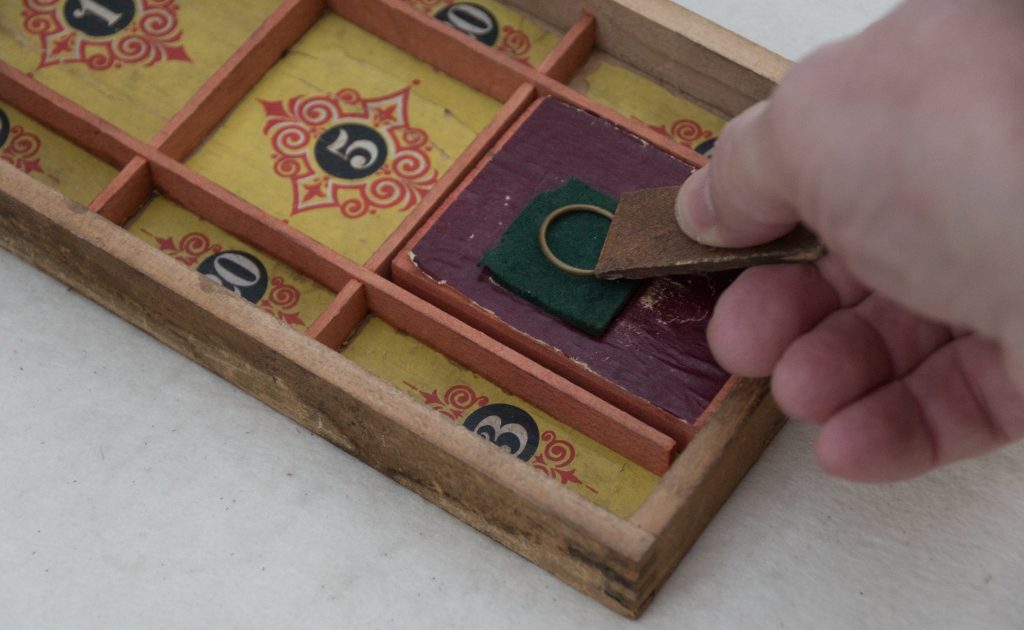
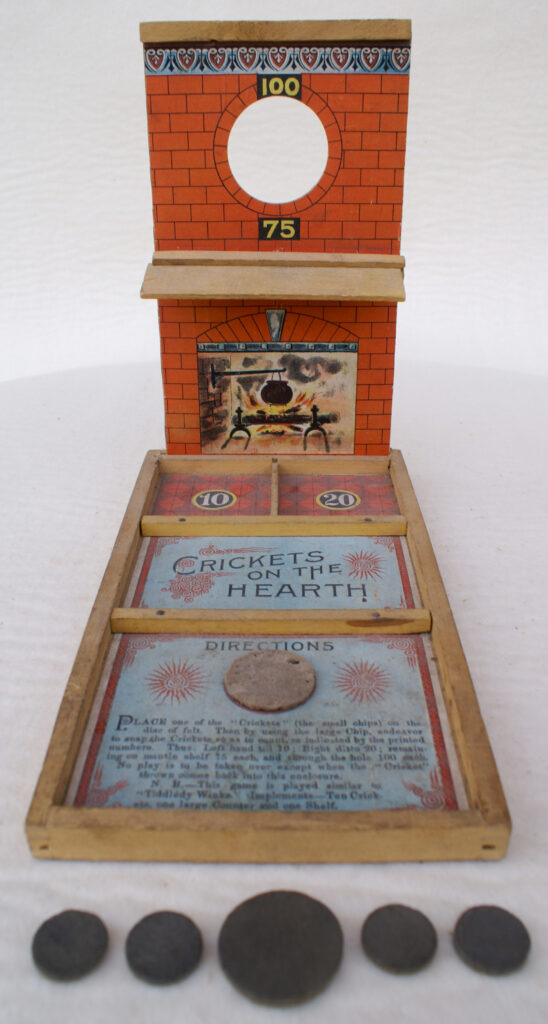
![[+template:(Tucker Tw ID • [+xmp:title+] — publisher • [+iptc:source+] — title • [+xmp:headline])+]](https://tiddlywinks.org/wp-content/uploads/2022/12/1891-10-01-Fire-and-Fireside-magazine-section-Premium-List-page-27-re-Crickets-on-the-Hearth-premium-620x1024.jpg)
